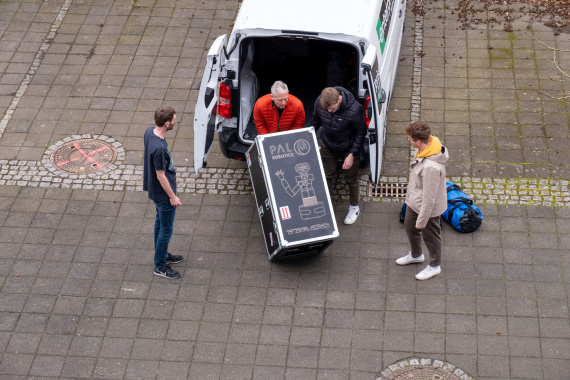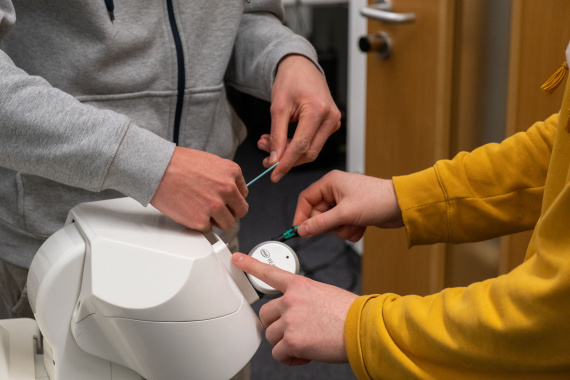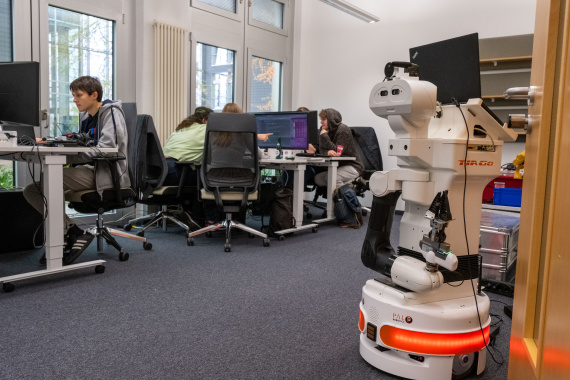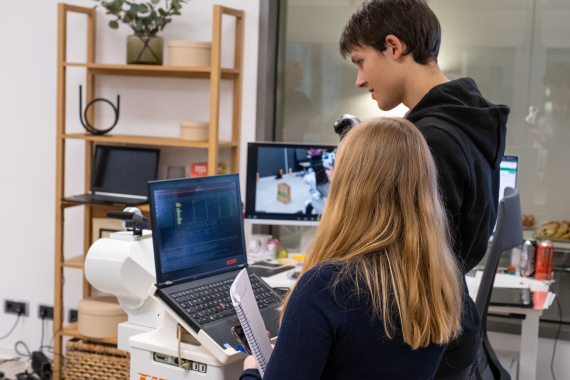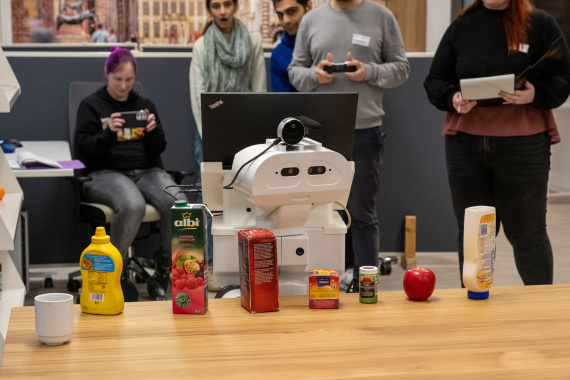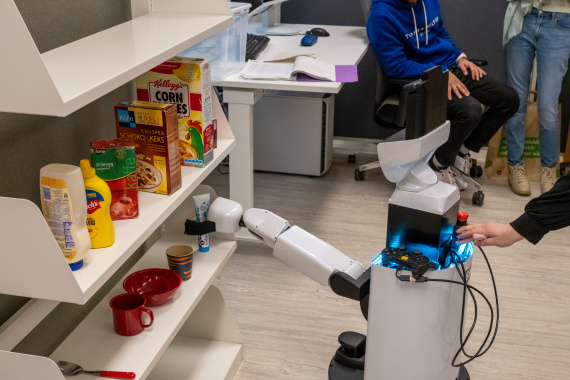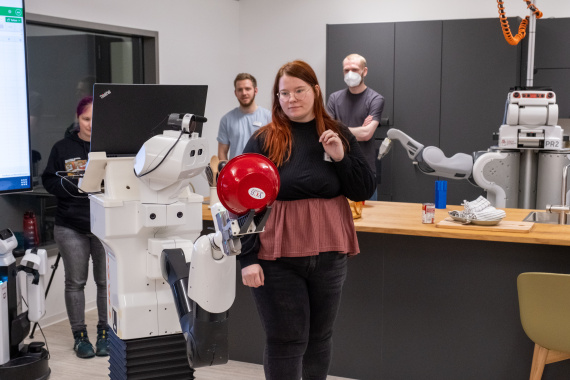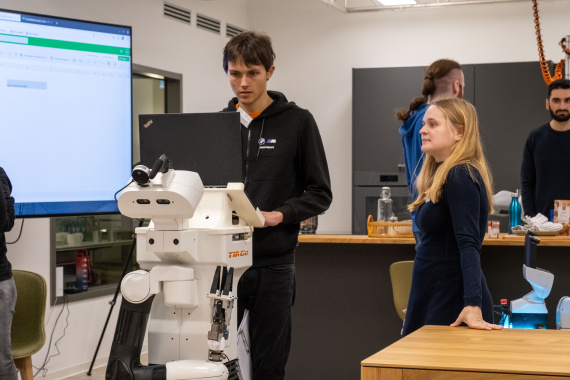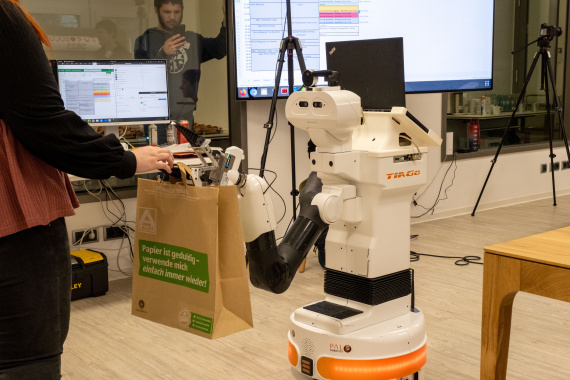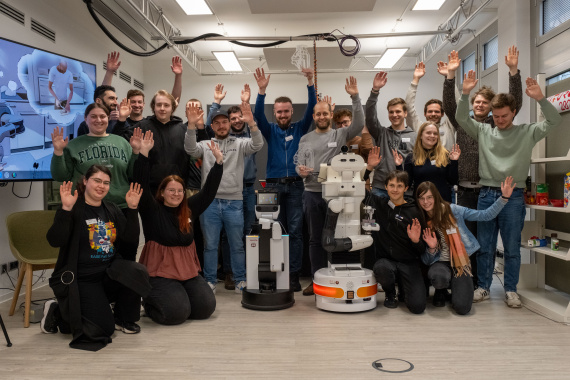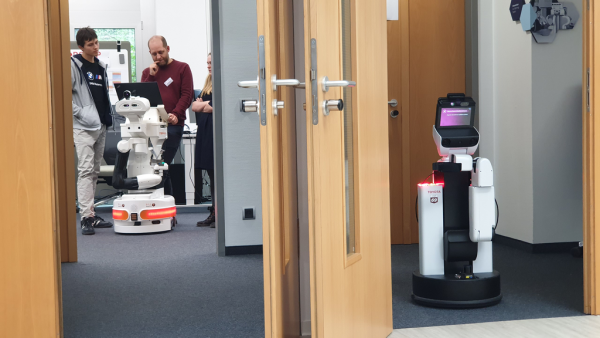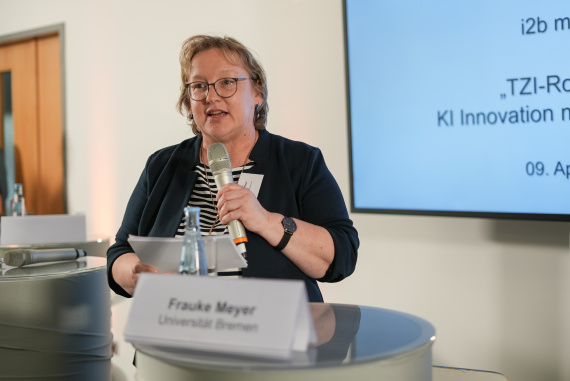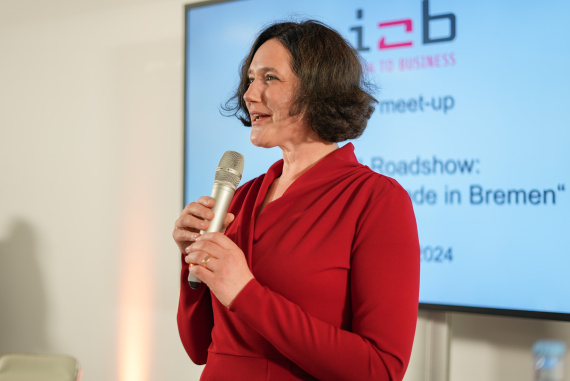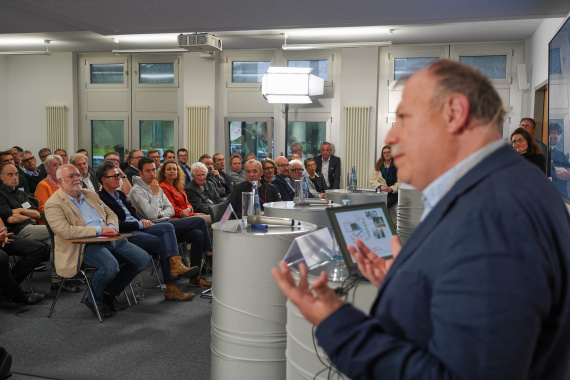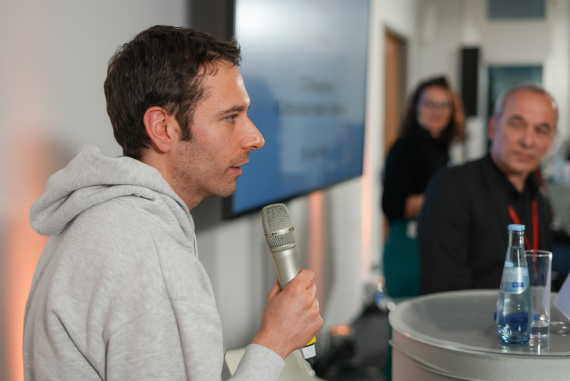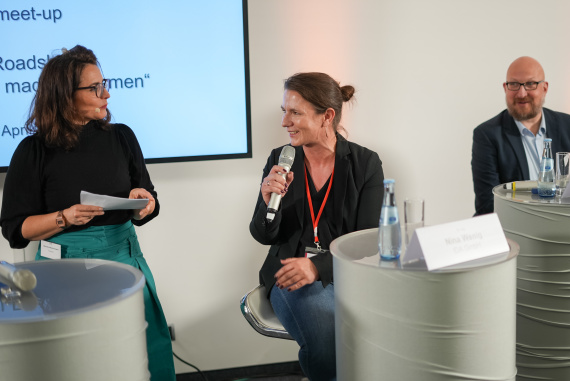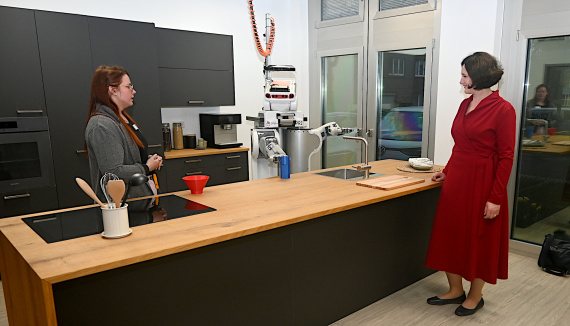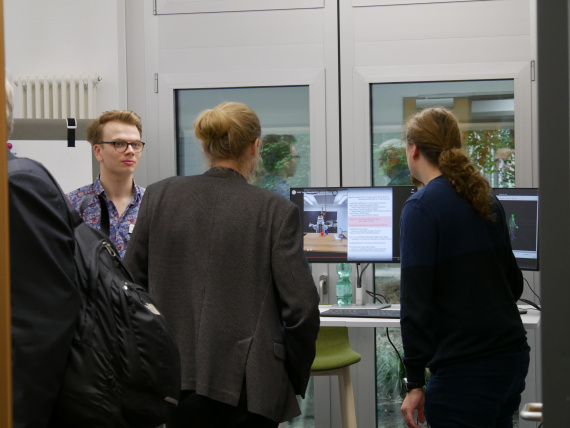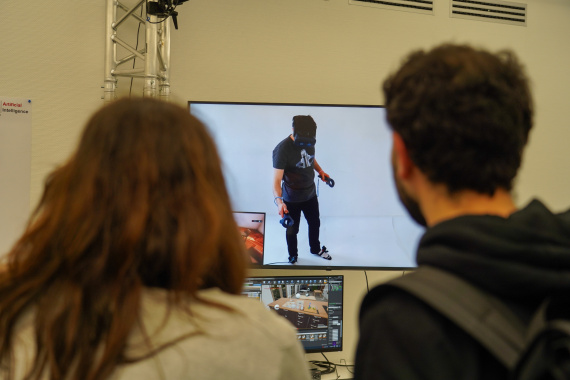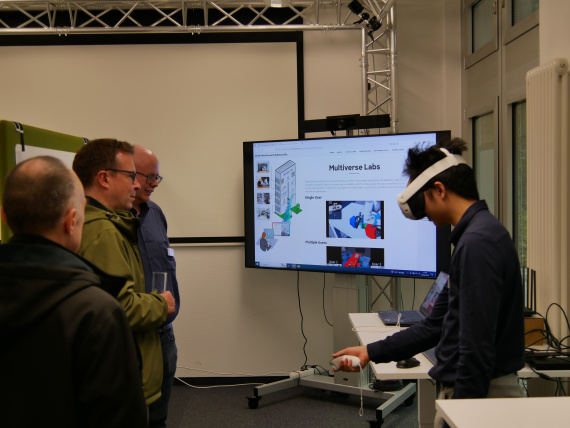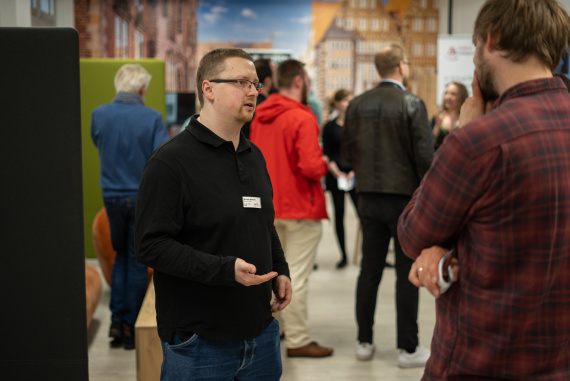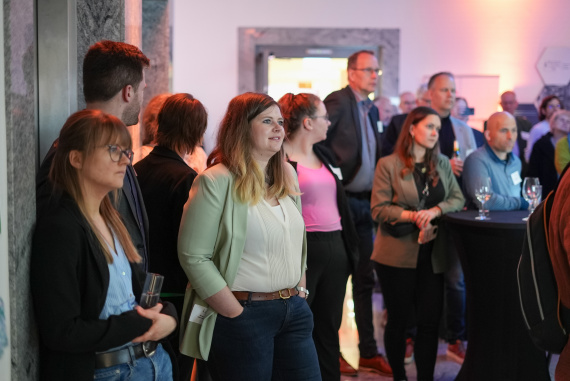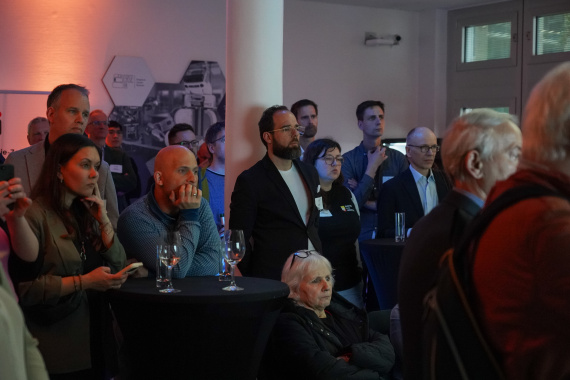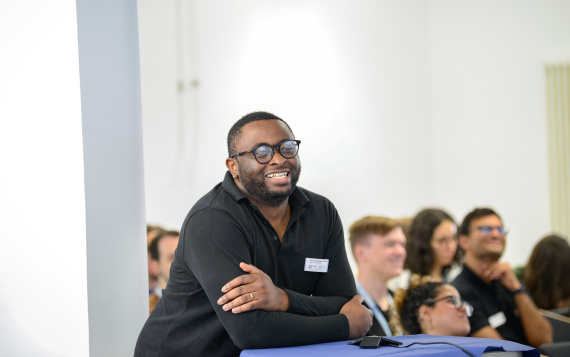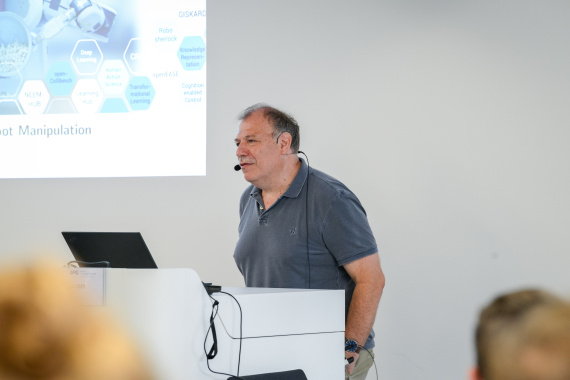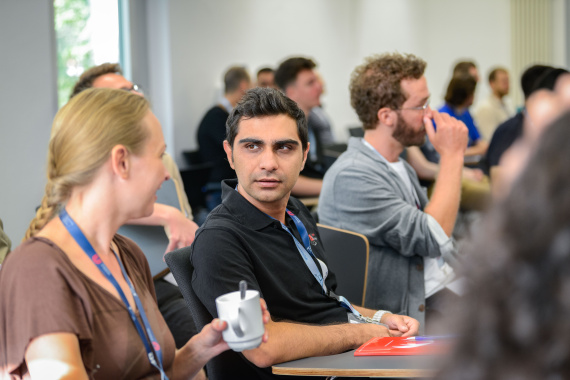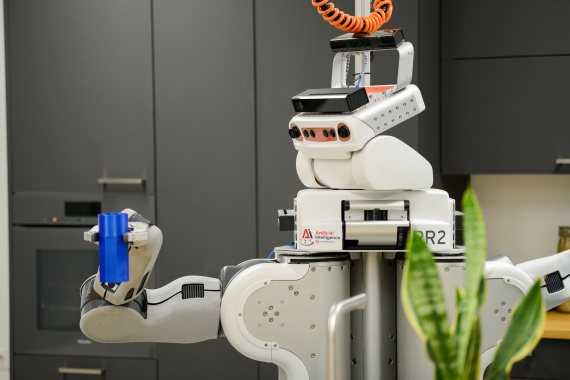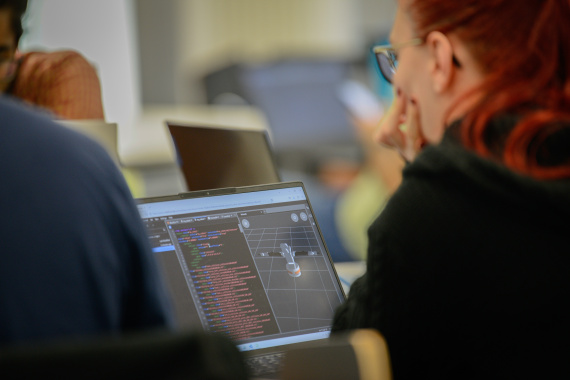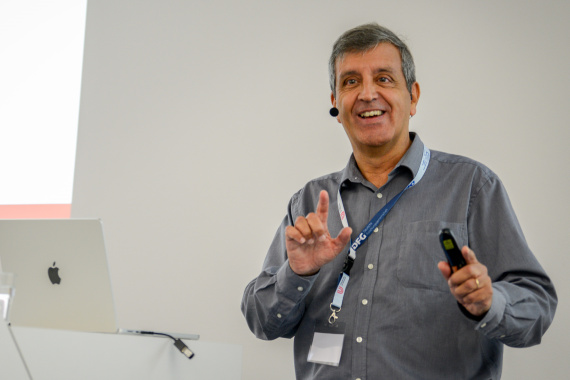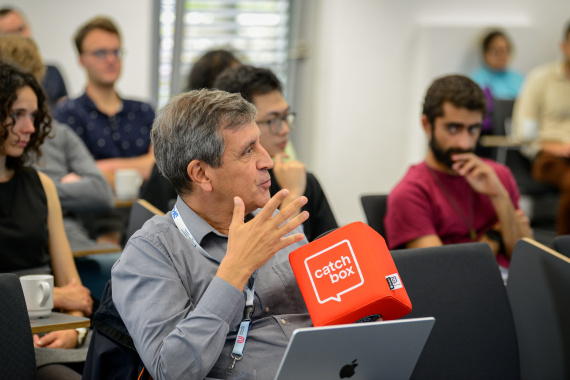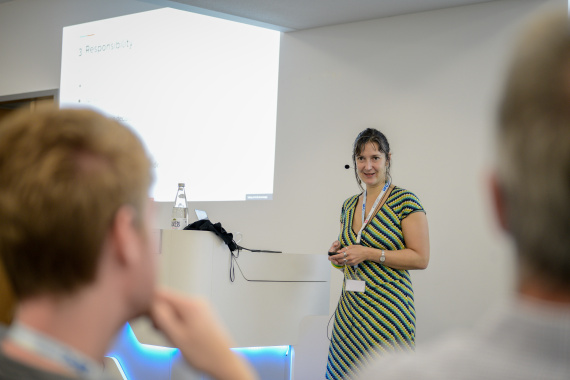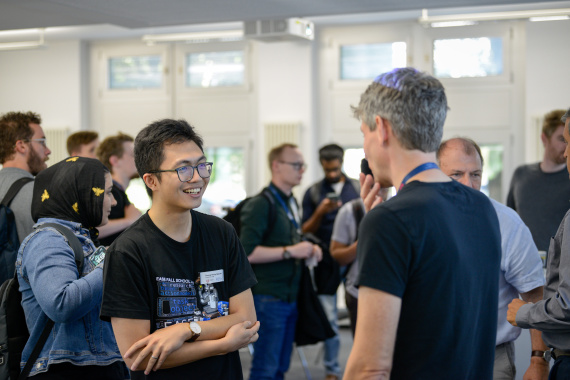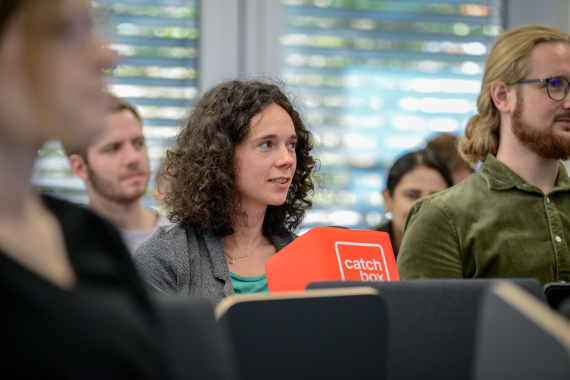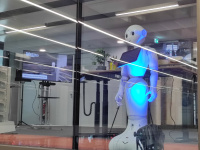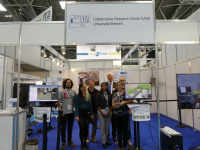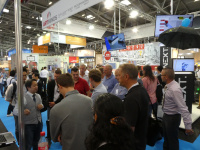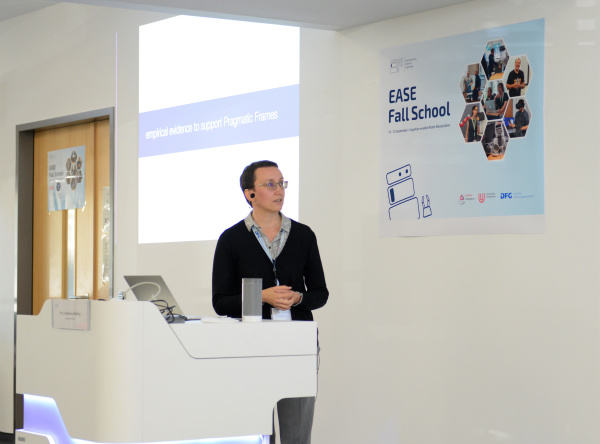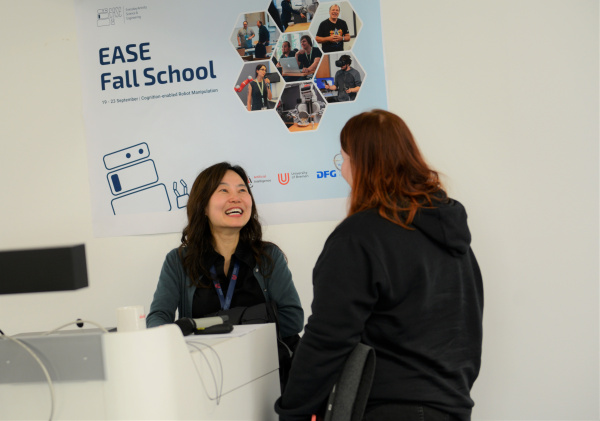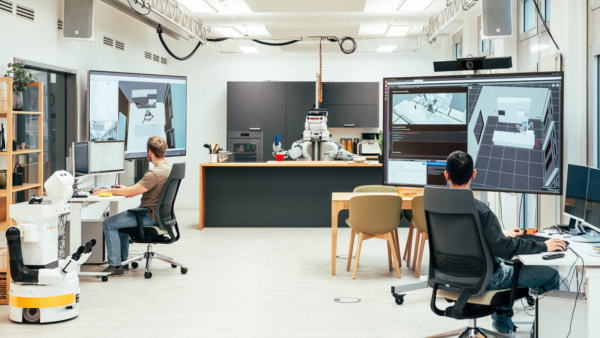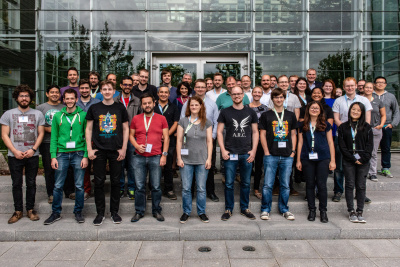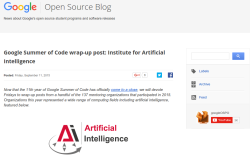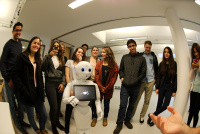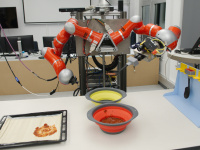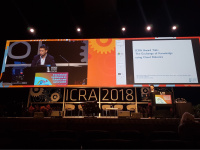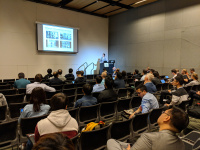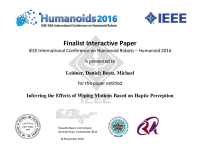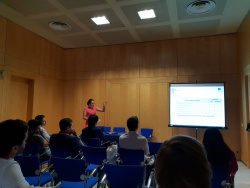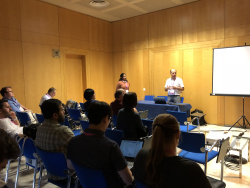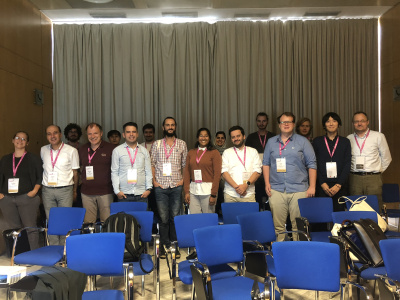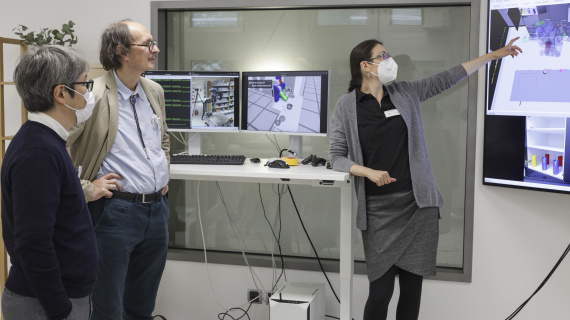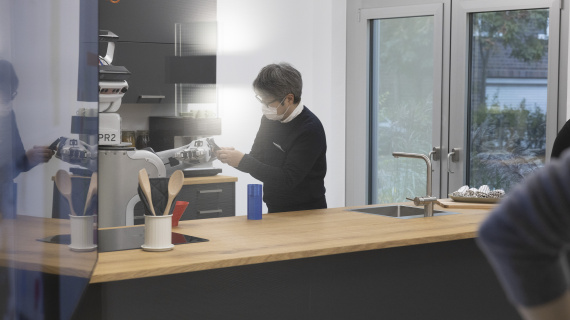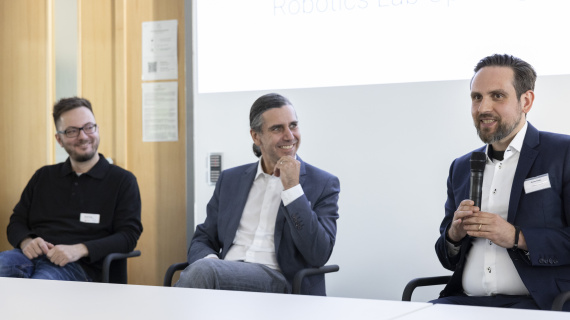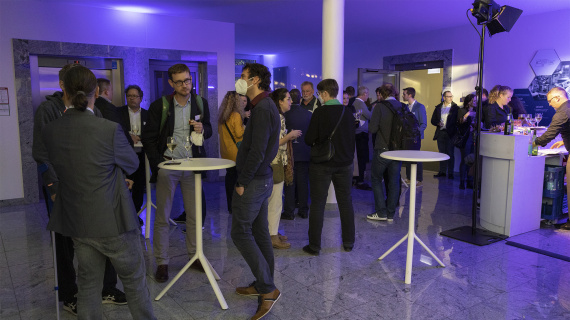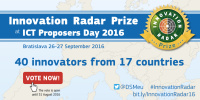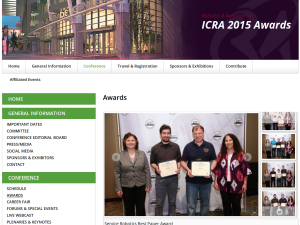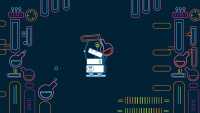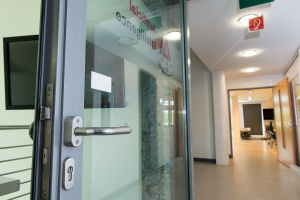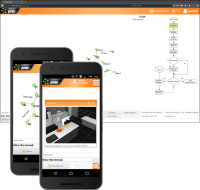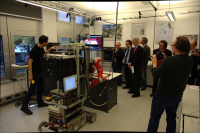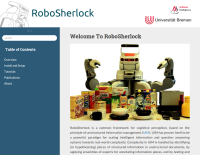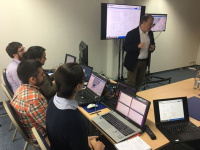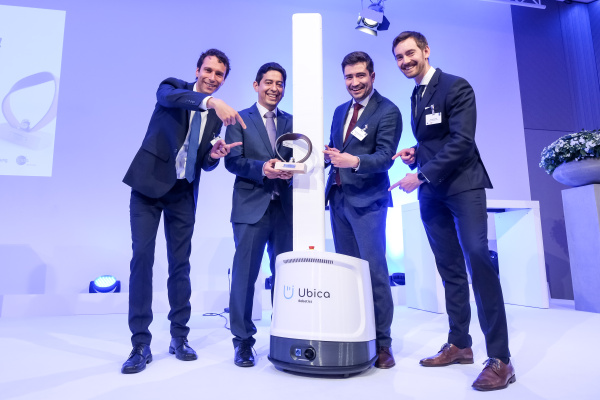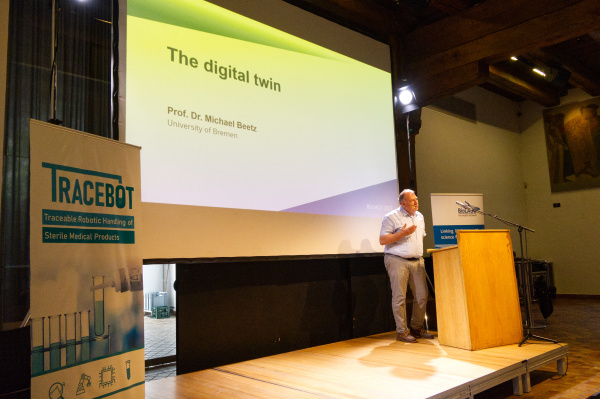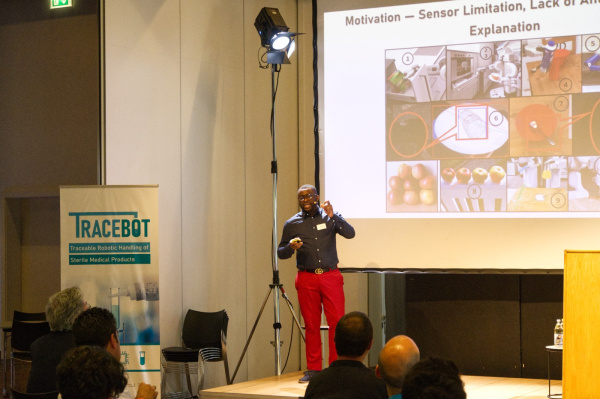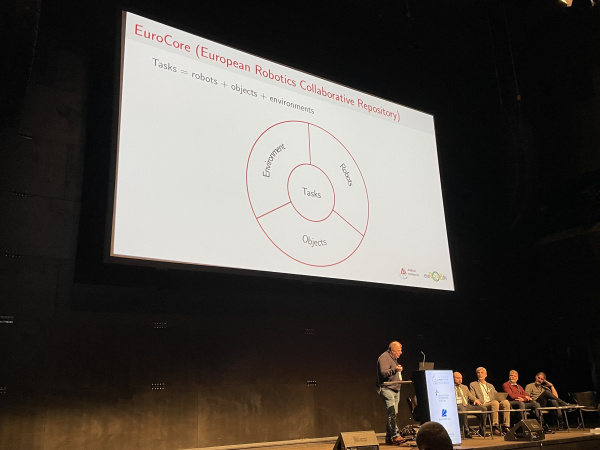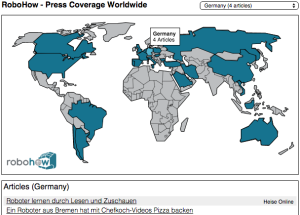This is an old revision of the document!
Welcome to the Institute for Artificial Intelligence
The Institute for Artificial Intelligence (IAI) directed by Prof. Michael Beetz is part of the Faculty of Computer Science and member of the Center for Computing and Communication Technologies (TZI) at the University of Bremen.
IAI investigates leading edge Artificial Intelligence methods for integrated computer systems including:
- robotic agents that perform human-scale everyday manipulation activities (research group: Intelligent Autonomous Systems)
- ambient and pervasive computing systems that assist humans at home, at work and during leisure activities (research group: Wearable Intelligence)
- large-scale distributed autonomous logistics and production networks (research group: Intelligent Systems in Production & Logistics).
IROS 2012
Autumn is IROS-time – the IAS team is looking forward to IROS 2012 in Vilamoura, Portual. Below is an overview of our presentations, we are looking forward to meeting you at the conference!
- Everything Robots Always Wanted to Know about Housework (But Were Afraid to Ask). Daniel Nyga and Michael Beetz. (MonAT7.3, Monday 11:30-11:45)
- A Unified Representation for Reasoning about Robot Actions, Processes, and Their Effects on Objects. Moritz Tenorth and Michael Beetz. (MonDT11.3, Monday 16:45-17:00)
- Improving Robot Manipulation through Fingertip Perception. Alexis Maldonado, Humberto Alvarez Heredia, and Michael Beetz. (TueDT10.1, Tuesday 16:15-16:30)
- Semantic Object Maps for Robotic Housework - Representation, Acquisition and Use. Dejan Pangercic, Moritz Tenorth, Benjamin Pitzer, and Michael Beetz (WedET5.1, Wednesday, 15:00-15:15)
2nd Integration Workshop of EU Project RoboHow
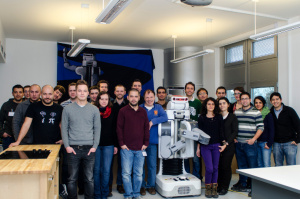
In mid-February, the 2nd joint integration workshop of the EU project RoboHow took place in our labs. PhD students and PostDocs from all our project partners visited us to work together to integrate their results and prepare the first review meeting.
While also focssing on software integration, the workshop also featured scientific presentations and hands-on tutorials. Furthermore, we visited the MARUM for a guided tour which all of us enjoyed very much.
The workshop was a huge success leaving all participants excited about the upcoming phases of RoboHow. We are looking forward to the next workshop which will be hosted by our project partner KTH, in Stockholm.
6 out of 200
 We are pleased to announce that one of our team members was selected in the
Kicking off the “6 Out Of 200” in the 5th Heidelberg Laureate Forum, September 24-29, 2017. Lisset Salinas Pinacho! expects “to get new ideas about my topic and other areas” and is looking forward to meeting Frederick Brooks, Jeffrey Dean, Barbara Liskov among many others at HLF17!. Please visit the following website for more information:
https://scilogs.spektrum.de/hlf/6-200-lisset-salinas-pinacho-teaches-robots-cook/.
We are pleased to announce that one of our team members was selected in the
Kicking off the “6 Out Of 200” in the 5th Heidelberg Laureate Forum, September 24-29, 2017. Lisset Salinas Pinacho! expects “to get new ideas about my topic and other areas” and is looking forward to meeting Frederick Brooks, Jeffrey Dean, Barbara Liskov among many others at HLF17!. Please visit the following website for more information:
https://scilogs.spektrum.de/hlf/6-200-lisset-salinas-pinacho-teaches-robots-cook/.
A friendly competition in preparation for the RoboCup@Home
Last week, we hosted a friendly competition for the first time in the rooms of the new Robotics Apartment at our Institute for Artificial Intelligence (IAI): The SutuRoboCup pitted the University of Bielefeld's TIAGo (PAL robotics) robot against the IAI's HSR ( Human Support Robot - Toyota) robot in a friendly head-to-head match in preparation for the RoboCup@Home competition in July.
Looking back at the SutuRoboCup
The SutuRoboCup is an outgrowth of the SUTURO student project, which computer science students at the University of Bremen can take as part of their Bachelor’s and Master’s degrees. The three-day event, a mock-up of the World Cup, gave the teams from Bielefeld and Bremen the opportunity to test their robots under competitive conditions, to get to know each other and exchange ideas.
The University of Bielefeld's TIAGo robot competed against the IAI's HSR robot in four challenges within the Houshold Robotics (“at home”) category: Cleaning the table, Serving breakfast, Storing groceries and General Purpose Service Robotics (GPSR).
Both teams followed different approaches. The Bremen team focused on one challenge, whereas the Bielefeld team tried to solve several challenges at the same time and came up with a good approach for most of them.
The HSR robot from Bremen emerged as the winner of the SutuRoboCup after scoring points in the “serving breakfast” challenge, in which the robot managed to pick two items from two different shelfs and place them on the breakfast table. However, both robots only partially completed most of the challenges in the competition, since both teams have just started their work. This made for some entertaining scenes and was also eagerly commented on in the livestream accompanying the event. Examples of these entertaining moments, which occurred at many points, included the HSR robot moving towards the window to grab objects reflected in its glass, or the TIAGo robot repeatedly announcing its entry into a room with a spoken “knock knock”.
All in all, the students were able to develop a good idea of the real RoboCup and how difficult it is for the robots to have to find their way around in a new environment. Besides the honour of winning, the teams were also able to win trophies, with which both sides walked out of the SutuRoboCup at the end of the three days. The general playful spirit with which the two teams met is to remain with them: later, at the real RoboCup, HSR and Tiago will compete in different leagues and not be direct competitors.
A recap of the AI Innovation Made in Bremen event
On April 9th, we had the opportunity to host the “TZI Roadshow: KI Innovation made in Bremen” event in our facilities. The event kicked off with inspiring welcome speeches from the University of Bremen’s Chancellor, Frauke Meyer, and Bremen’s Senator for Environment, Climate, and Science, Kathrin Moosdorf. Both highlighted the transformative impact of AI, especially its potential to revolutionize the Bremen region.
In the keynote speech by Prof. Beetz from our institute, he envisioned Bremen as a future global hub for AI-based robotics research. This bold idea resonated throughout the following panel discussion, where experts like Georg Bartels (Co-Founder & CEO at UBICA Robotics GmbH), Prof. Rainer Malaka (Managing Director of TZI Center for Computing Technologies), Dr. Nina Wenig (Founder of IDA GmbH), and Andreas Wulfes (CEO at Neusta Data Intelligence GmbH) explored AI’s expansive possibilities for regional business development in northwest Germany.
Afterwards, the more than 220 attendees engaged with groundbreaking research projects of the TZI and explored the innovative start-up exhibits. The atmosphere of the evening buzzed with a vibrant exchange of ideas among all participants.
We thank all guests and participants for their positive feedback on the evening and extend our thanks to our partners and colleagues at the TZI Center for Computing Technologies and idea2business (i2b) for the excellent teamwork in organizing this successful event.
Also visit the Digital Media Lab: Digital Media Lab - Universität Bremen
Images 1-5, 8 ,10-12 copyright by „Kontrast Medien und Marketing“
A recap of the EASE Fall School 2023
In the week from September 11 to 15, it was time for the EASE Fall School again: Experienced researchers and industry partners provided insights into cognition-enabled robotics for everyday activities at the EASE Fall School, organized by the Collaborative Research Center EASE.
The EASE Fall School is an annual intensive one-week programme aimed specifically at young researchers interested in the field of cognition-enabled robotics.
Lectures and interactive workshops provide knowledge and skills in AI and robot manipulation relevant to cognition-enabled everyday activity robotics. In addition, social and cultural activities around the academic program provide variety and offer the opportunity to get to know the city of Bremen a bit – this year, for example, on a tour of the Becks brewery and a visit to the IAI spin-off UBICA.
A programme that brings together theory and practice
The aim of each Fall School is to combine theory and practice in a fruitful way, so that participants can put their newly gained knowledge directly into practice.
To this end, this year's EASE Fall School once again offered its visitors a full and, above all, varied schedule:
The mornings were filled with exciting presentations by invited international guests from research and industry.
In the afternoons, participants were able to gain active insights into EASE research: In hands-on sessions prepared by early career researchers of the institute, they had the opportunity to get to know different frameworks and to test methods of simulation, modelling and robot control.
At the end of each day, there was the opportunity to exchange ideas in an informal setting and to see a little of the city of Bremen during social activities.
Synergies with the Artificial Intelligence and Cognition Workshop
This year, the Fall School was held in parallel with the 9th International Workshop on Artificial Intelligence and Cognition (AIC), which took place on September 14 and 15.
By bringing together research in artificial intelligence, robotics and cognition, the Collaborative Research Centre aims to deepen the dialogue between the various disciplines beyond the boundaries of the respective events, not only in terms of subject matter, but also in terms of shared learning and networking.
Participants of both events had the opportunity to exchange ideas across events and participants of the Fall School were invited to present their research at the workshop. The conjunction of the two events, which ended in a joint farewell session on Friday, provided a lively exchange across disciplines.
All in all, there was a lot of positive feedback from the participants and the faculty, who once again found this Fall School to be very insightful and broadening.
All lectures were recorded and are openly available on the EASE Learning Hub.
Best doctoral robotics thesis goes to Daniel Leidner
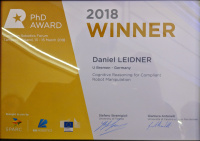
We congratulate Daniel Leidner for receiving the prize for the best doctoral robotics thesis in Europe at the European Robotics Forum 2018!
Daniel is co-leading the efforts of the EASE research project R4 at DLR and received his doctoral degree in 2017 from the Informatics faculty of the University of Bremen.
IAI's Raphael makes popcorn for Bild Zeitung
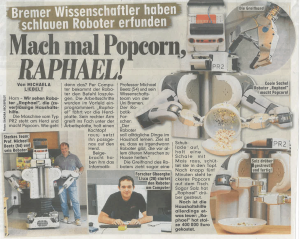
When journalist from Bild magazine visited our lab at Institute for Artificial Intelligence they were amazed about Raphael's cognitive abilities. They are relating their experience into an article describing how Raphael is cooking popcorn. Popcorn Demo is one of the first activities which our PR2 robot, Raphael, is able to perform fully autonomously. While preforming it Raphael is running a task execution framework which is coordinating the navigation, perception and manipulation routines.
Bild magazine is one of the most popular magazine in Germany. It was a pleasure for us to welcome them in our lab.
Bremer Transferzentrum Künstliche Intelligenz eröffnet / Opening of transfer centre for Artificial Intelligence Bremen
Find a report in German from the opening of the “Transferzentrum für Künstliche Intelligenz” on 7 July 2022 in the link below.
The centre promotes transfer of AI-technologies into the industry and bringing AI-players in Bremen together. At the event the Institute for Artificial Intelligence was present as a partner of the centre. At our booth, visitors were able to experience VR, learn about our research, gain an overview over our projects and get an impression of the technology our emerged startup Ubica GmbH has to offer.
https://www.bremen-innovativ.de/2022/07/transferzentrum-kuenstliche-intelligenz-eroeffnet/
Call for submissions: 9th workshop on Artificial Intelligence and Cognition
The 9th workshop on Artificial Intelligence and Cognition will be held at the Institute for Artificial Intelligence's TAB building on September 14 and 15, 2023. The goal of the AIC workshop series is to provide an international scientific forum for the discussion and presentation of theoretical and applied research developments in the areas of cognitive-inspired artificial intelligence, cognitive artificial systems, computational cognitive science and neuroscience.
Background
The main motivation for the AIC events lies in the fact that, historically, research in Artificial Intelligence has been based on a strong collaboration with other disciplines within the realm of the cognitive sciences.
Many of the original founders of AI as a research discipline aimed to develop human-level AI systems by taking inspiration from the heuristics of human cognition. This goal is still pursued (albeit with different interpretations) by many researchers around the world, and is one of the main challenges for the AI community. Indeed, the collaboration between AI and Cognitive Science has produced mutual benefits over the years.
In AI, this partnership has led to the realization of better intelligent systems. In cognitive science, in turn, this partnership has enabled the development of cognitive models and architectures that provide a better understanding of human reasoning.
In recent years, after a period of partial fragmentation of research directions, the area of cognitively inspired artificial systems is gradually attracting renewed attention from both academia and industry, and the awareness of the need for additional research in this interdisciplinary field has gained widespread acceptance.
Call for submissions
We invite all researchers who are interested in the overall goal and the topics of interest (below) of the AIC workshop series to submit their scientific contributions to the AIC scientific journal. AIC is a peer-reviewed scientific venue that particularly welcome papers raising challenging questions, innovative ideas and out of the box thinking, which will hopefully promote interesting discussions at the workshop. The participation of early state researchers in particular is encouraged. Topics of interest for the AIC community include but are not limited to:
- Knowledge Representation and Cognition (e.g. Neural Networks models, Conceptual Spaces, Ontologies and representation of common sense)
- Cognitive Architectures (e.g. SOAR, ACT-R) and Cognitive modelling for Artificial Systems
- B.I.C.A. (Biologically Inspired Cognitive Architectures) and systems Cognitive Robotics
- Human Robot Interaction
- Commonsense Reasoning
- XAI-Explainable Artificial Intelligence
- Evaluation of cognitively driven AI systems compared with other AI approaches
- Cognition and Semantic Web
- Methodological open questions on AI and Cognition
- Automated reasoning: deductive, probabilistic, diagnostic, causal and analogical inference
- Historical and theoretical relation among Cognitive Science and Artificial Intelligence
- Knowledge discovery and acquisition
- Modelling of human learning and knowledge acquisition in complex domains
- Computational Linguistics, Natural Language Processing Understanding Logic and Reasoning
- Evolutionary Computation
- Spatial Cognition and Computation
- Cognitively inspired Machine Learning
- Computational Theories of Learning
- Computational Creativity
- Cognitive and the Moving Image
- Computational Models of Narrative Understanding (Visuo-Auditory Narrativity, Perception)
- Decision Support Systems
Rules for submissions
All submissions must be written in English and must be formatted according to the information for LNCS Authors. All papers must present original work that is not currently under review.
We welcome the following types of contributions:
- Full research papers (8 to 14 pages)
- Short research papers (4 to 7 pages)
- Extended abstracts of recently published journal papers (1 to 2 pages)
Full research paper submissions must describe original and completed work, with inclusion of mature results and evaluation. Short research paper submissions can present a work in progress/position paper or include a small focused contribution with preliminary results.
- Extended Abstract: Authors are invited to submit an extended abstract of their recently published journal articles within the field of AI and cognition. The original article should be accepted and published no earlier than 2022.
Daniel Leidner wins Helmholtz Award for Doctoral Students
After the recent success of Dainel Leidner and his award for the best doctoral robotics thesis in Europe at the European Robotics Forum 2018, we're pleased to congratulate him once again. Last week, Daniel Leidner won the Helmholtz award for doctoral students at the „Helmholtz Horizons – The digital (R)Evolution in Science“ symposium.
Daniel is co-leading the efforts of the EASE research project R4 at DLR and received his doctoral degree in 2017 from the Informatics faculty of the University of Bremen.
DFG has approved funding for EASE
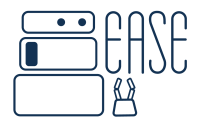 We are very happy that the Deutsche Forschungsgemeinschaft (DFG) has approved funding for the collaborative research center 'Everyday Activity Science and Engineering' (EASE). In EASE we will investigate the design, realization, and analysis of information processing models that enable robotic agents (and humans) to master complex human-scale manipulation tasks that are mundane and routine. EASE not only investigates action selection and control but also the methods needed to acquire the knowledge, skills, and competence required for flexible, reliable, and efficient mastery of these activities. Please visit the new EASE project website http://ease.informatik.uni-bremen.de/ for further information.
We are very happy that the Deutsche Forschungsgemeinschaft (DFG) has approved funding for the collaborative research center 'Everyday Activity Science and Engineering' (EASE). In EASE we will investigate the design, realization, and analysis of information processing models that enable robotic agents (and humans) to master complex human-scale manipulation tasks that are mundane and routine. EASE not only investigates action selection and control but also the methods needed to acquire the knowledge, skills, and competence required for flexible, reliable, and efficient mastery of these activities. Please visit the new EASE project website http://ease.informatik.uni-bremen.de/ for further information.
Discussion forum 'Art or Artificial? How AI composes'
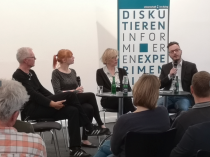 IAI member Dr. rer. nat. Daniel Nyga was invited to a discussion forum with the title 'Art or Artificial? How AI composes' in the Haus der Wissenschaft, Bremen.
IAI member Dr. rer. nat. Daniel Nyga was invited to a discussion forum with the title 'Art or Artificial? How AI composes' in the Haus der Wissenschaft, Bremen.
Together with Amke Block and Thorsten Plath, the plenum discussed the interesting topic of AI-music. What is the opinion of artists, the music industry and music science about it? Is it still art or is creativity a feature solely belonging to human beings? What can AI deliver in the music domain what the human can't - and the other way around? The event has been moderated by Maike Evers-Schmidt.
Photo Credit: Wissenschaft im Dialog gGmbH Berlin
Documentary Screening “Hi, AI” and Guest Talk 11.04.19
Dr. rer. nat. Daniel Nyga from the Institute for Artificial Intelligence will be an invited expert at a film screening event of Isa Willinger's documentary 'Hi AI', tomorrow, April 11th, 20:00 at the City 46 cinema.
Further details can be found at: city46
Location: CITY 46 | Birkenstraße 1 | 28195 Bremen
Bus & Tram Station: Herdentor
Stand at the Automatica
Our team was present at the Automatica to collected data from random participants in virtual reality scenarios. The more data we collect, the more variations on the executed tasks we can analyze!
Three tasks were investigated:
- doing the dishes (Kitchen)
- setting the table (Dinning room)
- vacuum cleaning (Living room)
Thank you to more than 200 participants!
EASE Fall School 2022
We are happy to announce: The upcoming EASE Fall School will take place from 19th to 23rd September 2022 in the facilities of the Institute for Artificial Intelligence in Bremen.
Our Fall School gives doctoral students the chance to learn about AI, Knowledge Representation, Reasoning, Robotics, and the challenging field of Robot Manipulation. In lectures and hands-on courses, you can exchange thoughts and ideas with our invited speakers and experts from the collaborative research center EASE.
Register now here: https://ease-crc.org/ease-fall-school-2022/#apply2022
Missed this opportunity?
If you can not participate the EASE Fall School 2022, you will have another chance in 2023. The CRC EASE will host another Fall School with lots of exciting topics in the field of robotics and AI.
EASE Fall School 2022 was a success
We are delighted to look back at another EASE Fall School to close the academic year. From September 19 – 23, we welcomed early stage researchers at our Collaborative Research Center EASE. The EASE Fall School aims at bringing together the young research community to advance research progress in the implementation of cognition-enabled everyday activity robotics.
Participants received comprehensive insights into the research methods and technologies that enable robots to accomplish tasks for and together with humans. Each day started with a lecture given by renowned researchers and industrial partners. In the afternoons, participants were able to apply their newly gained theoretical knowledge in hands-on sessions during which they ran their own experiments in a range of robot manipulation scenarios. The accompanying social program included joint culinary and cultural activities such as excursions to the sights of Bremen.
Insights from diverse perspectives
94 international participants with a diverse range of disciplinary backgrounds took part. Among these backgrounds, the fields of robotics and artificial intelligence in particular were highly present: David Vernon of Carnegie Mellon University Africa, John Laird of the University of Michigan, and Antonio Lieto from the University of Turin presented new insights into cognitive architectures. Jean Oh from the Carnegie Mellon University discussed explainable AI and Tetsnuari Inamura from the National Institute of Informatics in Tokyo gave a lecture on digital twins. As an industry partner, Benjamin Alt from ArtiMinds Robotics discussed knowledge representation and reasoning in industrial robotics.
From the cognitive science perspective, Katharina Rolfing (pictured above) from the University of Paderborn and Britta Wrede from the University of Bielefeld presented theories of interactive learning. Alessandra Sciutti from the Istituto Italiano di Tecnologia also addressed the topic of social interaction in her talk on the role of human-robot collaboration in cognitive robots.
This year's fall school thus continued what is beginning to become a popular tradition at the IAI and layed the groundwork for future collaborations. We thank all our guest speakers and participants for their excellent insights and dedication. This year's Fall School has once again highlighted how much the Fall School thrives on the coming together of diverse perspectives with a shared passion for enabling robots for real-world tasks. The Fall School is one of our most popular events at the IAI. It serves to connect us with our partners, develop our common research interests and to excite the next generation of researchers for this agenda. We are already looking forward to the next fall school, which will take place September 11-15, 2023.
All Fall School lectures are publicly available in the EASE Learning Hub. For information on the next Fall School, click here.
EASE fall school has started
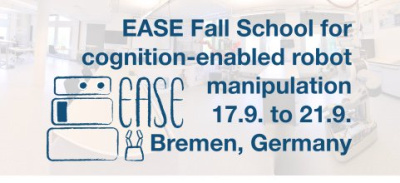 The EASE fall school has started, here are some first impressions!
The EASE fall school has started, here are some first impressions!
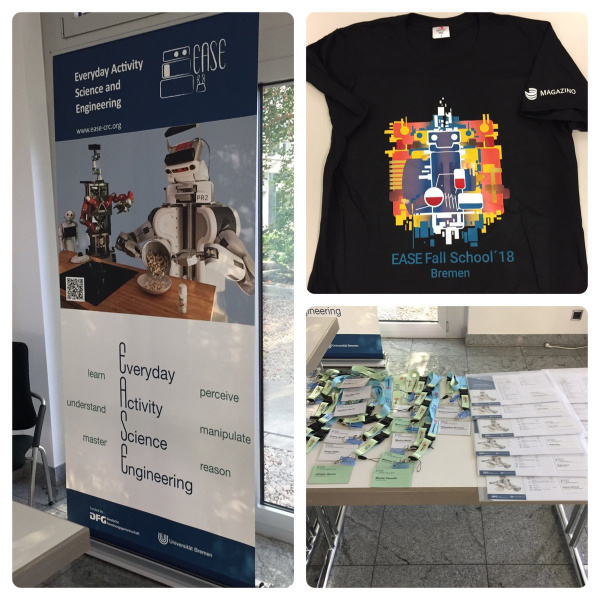
EASE members speaking at the International Symposium on Machine Intelligence for Future Society 2019
From the 9th until the 10th of september 2019 many leading robotics reseachers will discuss the state of the art in robotics within in the context of its integration into human society at the International Symposium on Machine Intelligence for Future Society 2019. We're happy to announce that EASE members Prof. Michael Beetz as well as Prof. Gordon Cheng will have the opportunity to be a part of the discussion and present the state of the art in their respective fields. Researchers interested in participating the event still have the chance to register for the symposium, which is held in Tokyo, Japan.
Enabling everyone to explore real robotics – online
Save the date to get to know the IAI's interactive learning environment for everyday robotics in an online workshop as part of this year's European Robotics Week hosted by the European Robotics Forum.
The IAI's workshop at the 2023 European Robotics Forum
In the upcoming workshop we will present our interactive learning platform IntEL4CoRo, which is designed to enable students and researchers to work with our frameworks.
The workshop will consist of two tutorials:
- how to acquire web knowledge for robot action execution
- how to perform everyday manipulation tasks in the interactive learning environment.
Mark your calendar: November 23rd, 10:00 - 13:00 CET
For more information, visit the IntEL4CoRo project website.
For access to the online event, visit https://events.eu-robotics.net/event/everyday-activitity-knowledge-acquisition-and-execution-in-an-interactive-learning-environment/
European Robotics Challenge: IAI accepted as challenger
 We're happy and excited to announce that a team consisting of PhD
students from the Institute for Artificial Intelligence and
undergraduate students from the successful Suturo project have been accepted to compete in the European Robotics Challenge (EUROC). The team
will be headed by Prof. Michael Beetz.
We're happy and excited to announce that a team consisting of PhD
students from the Institute for Artificial Intelligence and
undergraduate students from the successful Suturo project have been accepted to compete in the European Robotics Challenge (EUROC). The team
will be headed by Prof. Michael Beetz.
Our team has successfully applied to participate in the first stage of challenge 2 of EUROC, focussing on logistics and manipulation in dynamic shop floor environments. During this summer, challengers will develop their solutions in simulation. Challenge entries will be evaluated in November.
European Robotics Challenge: IAI successfully passed Stage 1a
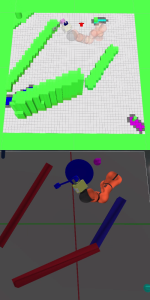 Our EuRoC challenger team has successfully passed the qualification phase for the Europe wide program, which featured many renowned robotics groups. Within the challenge, over seventeen teams attempted to qualify, of which fifteen met the set requirements. Having solved the challenge's tasks very well, our team earned the second place within the overall ranking.
Our EuRoC challenger team has successfully passed the qualification phase for the Europe wide program, which featured many renowned robotics groups. Within the challenge, over seventeen teams attempted to qualify, of which fifteen met the set requirements. Having solved the challenge's tasks very well, our team earned the second place within the overall ranking.
To solve each task, it was required to implement a generalized high-level plan, which is robust against changes in the environment of the robot. In an objective evaluation, the EuRoC jury used unknown scenes to test our contribution. Changing object appearances also required a generalized and stable perception approach for object detection and pose estimation. Other topics have been motion planning for manipulation & mapping of the workspace.
The upcoming phase of the program will bring challengers, system integrators, and end users of the developed techniques together to form project groups. These groups will then work together to further develop, implement, and test mobile manipulation systems in real world settings.
European Robotics Challenge IAI teams up for the next stages
Between the 16th and 17th of December 2015, IAI Bremen's challenger team has participated in a EuRoC match making workshop held in Gatwick, UK. We have met several end-users in 1:1 meetings to discuss the details of potential use cases. The end-users are spread all over europe and showed us interesting applications for autonomous systems. The experience was positive, and we gauge that there is a real interest and a place for new robotics research and development in industrial robotics. Further, we believe that we have significant contributions to make to that research.
We are not alone in that belief, and we have received several offers for collaboration. We decided on a use case that in our opinion presented a good mix of tractability and novelty, and are currently writing a proposal with the respective end-user, due on February the 9th, to proceed to the next stages of the EuRoC. Five of the (at most) fifteen project proposals will be accepted for the next rounds, where we will encounter more challenges with increasing complexity, if our proposal can convince the EuRoC jury.
IAI-coordinated EU Project RoboHow in the News
Following up on the second integration workshop of the EU FP7 project RoboHow, we held a press conference about the project on February 27th. The robot presented its skills in flipping pancakes using a constraint-based controller developed in the RoboHow project and prepared popcorn for the journalists.
In addition to articles in several German newspapers, RoboHow also appeared in the nation-wide German evening news at ZDF and in a longer report in the “buten un binnen” show at Radio Bremen. For more information on the project please visit the descriptions on our website or the pages of RoboHow.
Finalist at ICAR'17
We are pleased to announce that our joint paper with the Institute of Robotics and Mechatronics,DLR:
* Storing and Retrieving Perceptual Episodic Memories for Long-term Manipulation Tasks, Ferenc Balint-Benczedi, Zoltan-Csaba Marton, Maximilian Durner and Michael Beetz
has been selected as an ICAR 2017 best paper award finalist.
The paper presents a robotic perception system that generates perceptual episodic memories during the execution of a task. To allow easy retrieval of these memories we introduce an object and scene description language that serves as a layer of abstraction between the structure of the perception logs and the semantic interpretation of these. The description language can be used through a query interface to retrieve specific parts of the generated episodic memory. The purpose of the proposed system is two-fold: to enable on-line retrospection and specialized training of perception routines and to enable researchers to interactively explore perception results.
Finalist Best Cognitive Robotics Award at IROS '17

We are happy to announce that our research paper
- Multidimensional Time Series Shapelets Reliably Detect and Classify Contact Events in Force Measurements of Wiping Actions, Simon Stelter, Georg Bartels, and Michael Beetz
has been selected as a finalist for the best cognitive robotics award at IEEE IROS 2017.
Final demonstration of the SUTURO bachelor project
After the demonstration of the intermediate milestone in February, the SUTURO bachelor project has now presented its final results. As part of the project, 14 students implemented a mobile pick-and-place application on the PR2 robot. The PR2 is able to recognize objects of different kinds and sort them into a box (for non-edible items) or bring them to the opposite counter (in case they are edible). If an object is unknown, it tries to scan the barcode and retrieve semantic information about this object from the Web. More information can be found in the video on the right and on the SUTURO homepage. For implementing this functionality, the SUTURO team used open-source software components developed by the IAI group such as the CRAM plan-based executive and the KnowRob knowledge base.
First virtual TransAIR conference
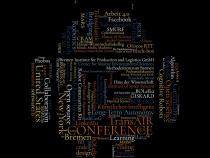
The first virtual TransAIR conference called “Democratize AI with open research” kicks off today.
From Wednesday, September 30th until October 14th participants can listen to pre-recorded material by international speakers on advances, challenges and potentials of open science in Artificial Intelligence as well as robotics, task planning, robot motor control, knowledge representation, reasoning, machine learning and computer vision.
Moreover, the schedule includes interviews, Q&A's, a panel discussion and tutorials on open projects alongside many networking opportunities with other participants.
Learn more here https://transair-bridge.org/conference-2/
Registration is possible until Sunday, October 4th.
Girl's Day 2018
Yesterday we had very special guests for the Girls’ Day 2018 at our Institute for Artificial Intelligence. It is the day of the year where young girls explore different professional fields and get inspired by other women, who shape their fields of work in a very passionate way. It was our main goal to demonstrate to these girls that they will be part of a very exciting future, where their contribution will certainly matter.
Seventeen girls of different ages, ranging from 10 to 14 years old, and different schools had the opportunity to immerse themselves into the world of robotics and artificial intelligence. A diverse program was organized to provide them an overall overview of our promising research activities and projects. The girls were engaged in very interesting discussions about the various fields of informatics and robotics. They were highly fascinated by our little robot “Pepper”, which succeeded in showing them how fun and entertaining robotics can be. In our virtual reality environment, they learned how teaching robots new actions can be solved in a very playful way. Overall the girls were very impressed and developed a greater interest to the fields of informatics and robotics.
Google Summer of Code 2014
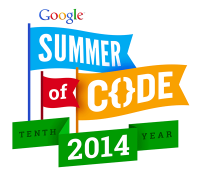 The Institute for Artificial Intelligence has been selected as
mentoring organization for the
Google Summer of Code 2014. The initiative, started in 2005, sponsors
students during the summer months for contributing code to selected open
source projects.
The Institute for Artificial Intelligence has been selected as
mentoring organization for the
Google Summer of Code 2014. The initiative, started in 2005, sponsors
students during the summer months for contributing code to selected open
source projects.
As part of our research, we are maintaining and developing the plan-based control system CRAM, allowing the specification and execution of complex robot behavior, and the KnowRob knowledge base that provides robots with the knowledge required to perform their tasks. You can find more information about the proposed projects as well as contact information of the designated mentors at our Google Summer of Code page.
Google Summer of Code 2015

The Institute for Artificial Intelligence has been selected as mentoring organization for the Google Summer of Code 2015 as one out of 137 organizations world-wide. The initiative, started in 2005, sponsors students during the summer months for contributing code to selected open source projects. This is our second year in the Google-sponsored program.
As part of our research, we are maintaining and developing the plan-based control system CRAM, allowing the specification and execution of complex robot behavior, and the KnowRob knowledge base that provides robots with the knowledge required to perform their tasks. You can find more information about the proposed projects as well as contact information of the designated mentors at our Google Summer of Code page.
Google Summer of Code 2017
We are thrilled to announce that The Institute for Artificial Intelligence has been selected as mentoring organization for the Google Summer of Code 2017 as one out of 201 organizations world-wide. The initiative, started in 2005, sponsors students during the summer months for contributing code to selected open source projects. This is our third year in the Google-sponsored program and we're looking forward to mentoring interested students and introducing them to our software tools and research endeavors.
You can find more information about the proposed projects as well as contact information of the designated mentors at our Google Summer of Code page.
Google Summer of Code 2018
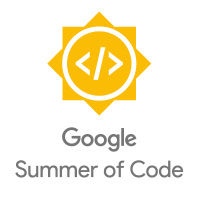 The Institute for Artificial Intelligence has been selected as
mentoring organization for the
Google Summer of Code 2018 as one out of 212 organizations world-wide. The initiative, started in 2005, sponsors students during the summer months for contributing code to selected open source projects. This is our third year in the Google-sponsored program and we're looking forward to mentoring interested students and introducing them to our software tools and research.
The Institute for Artificial Intelligence has been selected as
mentoring organization for the
Google Summer of Code 2018 as one out of 212 organizations world-wide. The initiative, started in 2005, sponsors students during the summer months for contributing code to selected open source projects. This is our third year in the Google-sponsored program and we're looking forward to mentoring interested students and introducing them to our software tools and research.
You can find more information about the proposed projects as well as contact information of the designated mentors at our Google Summer of Code page.
Google Open Source Blog Feature
After the Google Summer of Code 2015 was concluded, Google started to feature selected members of the 137 open source organizations that took part in the GSoC 2015 program on their open source blog. After having had a very positive experience during GSoC 2014, our institute offered four projects within the Summer of Code this year.
We are pleased to announce that, as the first organization, the Institute of Artificial Intelligence is featured on Google's blog to describe impressions from this year's project period. You can find the link to the full blog post here.
Highschool pupils from Arequipa meet the robots in our lab
Twelve pupils from Arequipa, Peru interested in studying Artificial Intelligence and Robotics at University of Bremen visited the robots from our lab. Next year is their final year of studies before continuing to university and knowing the international reputation of University of Bremen in Robotics and Artificial Intelligence they chose to visit the research laboratories of our university. It was our pleasure to have them as guests and hence confirm the international reputation of our university. In our lab they interact with our Pepper robot and explored his social capabilities. Furthermore they saw the PR2 robot making popcorn and Boxy robot baking pizza for them. We look forward to having them back as students.
IAI-Head Professor Michael Beetz awarded prestigious ERC Advanced Grant
We are happy to share the success of the head of our Institute for Artificial Intelligence, Professor Michael Beetz, who has been awarded an Advanced Grant from the European Research Council (ERC) for his scientific work.
The ERC Advanced Grant recognises Michael Beetz as an outstanding leader with a track record of ground-breaking research achievements his field. The Grant is a special award intended to enable research work that comes with increased risks but also great promises for tackling societal challenges.
A Future-oriented cognitive Action Modelling Engine (FAME)
The aim of Beetz‘ new project Future-oriented cognitive Action Modelling Engine (FAME) is to design and implement a hybrid knowledge representation and reasoning framework for prospective reasoning, using open manipulation task learning as a benchmark challenge. This type of learning is intended to facilitate the development of highly versatile, so-called general-purpose robotic agents that can flexibly perform manipulation tasks on any object for any purpose.
The results of this project are expected to have significant impact on the fields of AI and robotics by expanding the cognitive capabilities of robots to learn and reason about how to perform actions and why. With the knowledge gained from this framework, AI-based robots will eventually be able to operate more autonomously to assist us in our daily lives.
Beetz’ research thus comes with far-reaching benefits and implications: In the context of demographic change, for example, it holds great potential for enabling the physically disabled to live independently in their own homes for longer.
In addition to the symbolic recognition of Beetz' achievements, obtaining the ERC Advanced Grant also supports their research in a more tangible way. For a period of five years, Beetz’ frontier research will be funded with 2.5 million euros.
We are highly pleased about this award for Professor Beetz and congratulate him on his success.
IAI and EASE in upcoming film “Hi, AI”
The Institute for Artificial Intelligence and EASE will appear in the upcoming documentary film “Hi, AI” by Isa Willinger. Shooting took place in 2018. The film will be released on March 7, 2019. Watch the trailer on wwww.hiai-film.de and try to spot PR2 at 1:13. The film won the 2019 Max Ophüls Prize for Best Documentary Film. Congratulations!
IAI on TV
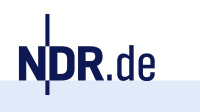 A couple of months ago, the NDR TV team producing the feature-length documentary “Norddeutschland von oben” visited our lab to talk to us about our research. Last Friday, the NRD first aired the resulting movie in its afternoon program. Our lab and the Technologiepark Bremen are covered starting around minute 55. You can watch the movie on-demand here.
A couple of months ago, the NDR TV team producing the feature-length documentary “Norddeutschland von oben” visited our lab to talk to us about our research. Last Friday, the NRD first aired the resulting movie in its afternoon program. Our lab and the Technologiepark Bremen are covered starting around minute 55. You can watch the movie on-demand here.
IAI at ScienceGoesPublic
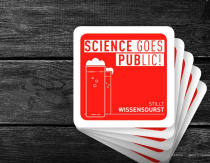 The ScienceGoesPublic initiative is a very popular format in which scientists present their research topics in bars and pubs in Bremen and Bremerhaven a in cozy and casual environment to the broad public.
The ScienceGoesPublic initiative is a very popular format in which scientists present their research topics in bars and pubs in Bremen and Bremerhaven a in cozy and casual environment to the broad public.
On Nov 21st, IAI member Dr. Daniel Nyga will give a presentation about Artificial Intelligence and robotics. More information can be found at https://www.sciencegoespublic.de/programm/denn-sie-wissen-was-sie-tun---wie-roboter-lernen.201.
IAI Press Coverage
We are pleased to announce that the activities of the IAI have been recently covered by many important media sources including the Spiegel, n-tv and the AD from the netherlands. The articles gave an insight into one of our research areas, which is the domain of everyday activities on different robot platforms. Beside our research on this topic, the articles also mention our open research platform openEASE, which enables researchers worldwide to work with episodic memories gathered from various robots.
IAI's Research in IEEE Robotics and Automation Magazine
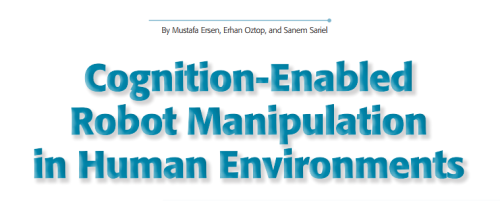
We are happy to announce that our research has been featured in an article titled "Cognition-Enabled Robot Manipulation in Human Environments" by Ersen, Öztop and Sarıel in IEEE Robotics and Automation Magazine. The article mainly summarizes latest developments of cognitive robotics in everyday environments with particular focus on knowledge representation, perception, planning/adaptation and learning. Our software platforms, KnowRob, RoboSherlock, and CRAM, are cited in the respective sections of the article.
We recommend everybody to take a look at the article
IAS 2012
The International Conference on Intelligent Autonomous Systems will take place in Jeju Island, Korea from June 26-29. Michael Beetz will give a plenary talk on the topic of “Robotic Agents Performing Human-Scale Everyday Manipulation Tasks - In the Knowledge Lies the Power”. In addition, we have two papers in the session on “Web-Enabled Robotics”:
- Exchange of Action-related Information among Autonomous Robots (Thursday, 10:30-10:50, Room 301)
- RoboEarth Action Recipe Execution (Thursday, 09:30-09:50, Room 301)
IAS at the Automatica 2012
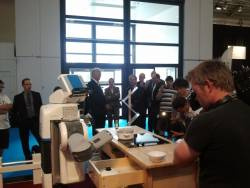
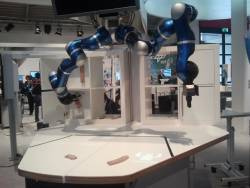
The IAS team will be involved in two demonstrations at the Automatica trade fair: Our PR2 will prepare popcorn for the visitors at the CoTeSys booth in hall B1, booth 321. As part of the DLR booth, parts of the team will present first results of the SAPHARI project, namely DLR lightweight arms playing with BRIO wooden toy railways (hall B3, booth 520/521). We are looking forward to meeting you there!
ICRA 2018
We are happy to announce that the talk held by our team member Asil Kaan Bozcuoglu , whose paper “The Exchange of Knowledge Using Cloud Robotics” ( Asil Kaan Bozcuoğlu, Gayane Kazhoyan, Yuki Furuta, Simon Stelter, Michael Beetz, Kei Okada and Masayuki Inaba) was finalist for the IEEE ICRA Best Paper Award in Cognitive Robotics and for the IEEE ICRA Best Paper Award in Service Robotics. The EASE Workshop at the ICRA 2018 was a great success too!
"Inferring the Effects of Wiping Motions Based on Haptic Perception" Best Paper Finalist at Humanoids 2016
We are very happy to announce that the paper authored by Daniel Leidner from Robotics and Mechatronics Center of DLR and Prof. Michael Beetz, PhD from Institute or Artificial Intelligence was nominated for The Best Interactive Paper Award at Humanoids 2016.
The paper presents how the haptic perception paired with a qualitative effect representation can be used to reason about the task performance of robotic wiping motions despite poor visual information. The proposed approach relates the desired contact force to the measured end-effector force in order to simulate the effect of the previously executed wiping motions. In this way the proposed approach is able to replan recovery motions after it successfully distinguished good from bad contact situations, w. r. t. the desired effect. The proposed approach was evaluated on a set of experiments with the robot Rollin' Justin.
Lab Opening Event
On October 5th and 6th, about 150 participants from science and industry took the opportunity to exchange ideas and gain insights into the new laboratories at our Institute for Artificial Intelligence (IAI).
The event marked the official opening of the “Imitation Learning Lab” and the “Robotics Apartment” on the premises of the Bremen Technical Academy (TAB). The attendees were welcomed by Dr. Claudia Schilling, Bremen's Senator for Science and Ports, Prof. Dr. Kerstin Schill, Director of the Institute for Cognitive Neuroinformatics at the University of Bremen, Dr. Mandy Boehnke, Vice President of the University of Bremen and Prof. Dr. Gerhard Sager, Rector of the University of Bielefeld.
A next-generation lab
There was plenty to celebrate: Especially the opening of the Robotics Apartment was remarkable, as it was actually celebrated twice – a digital twin of the apartment was made available online concurrent with the opening of the physical lab. The digital twin is an exact digital copy of the Robotics Apartment, allowing scientists around the world to perform experiments in the simulated lab. The opening of this next-generation lab therefore represents an invitation to the international scientific community to collaborate with us and use our state-of-the-art infrastructure for the advancement of research in AI-based robotics.
Each day of the two-day event, which was streamed online, had a different focus. On Wednesday, the IAI hosted an international symposium. In entertaining keynote lectures, researchers provided insights into the current state of research in the fields of artificial intelligence and robotics. We were fortunate to attract a diverse group of speakers from the scientific community in Bremen as well as from other countries such as Italy, Sweden and Japan.
Thursday's program was geared towards the exchange of ideas between science and industry. In four panels, researchers and industry representatives discussed their experiences with transferring research results from science to industry. In addition to scientific institutions such as the DLR and TU Munich, various established companies (Neusta, Siemens and SAP) and start-ups (Ubica Robotics, Artiminds Robotics and Cellumation) took part in the first three of these panels. The fourth panel was dedicated to the importance of enabling Open Research.
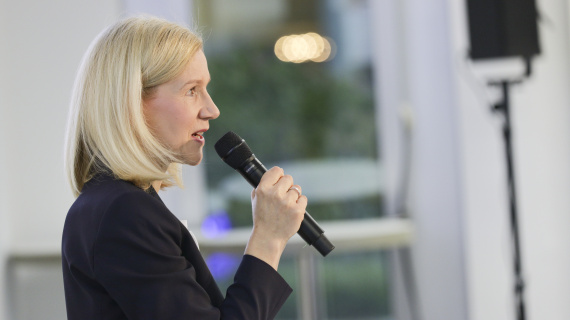 Professor Jutta Günther, the new rector of the University of Bremen, welcomed the symposium's attendees with opening remarks.
Professor Jutta Günther, the new rector of the University of Bremen, welcomed the symposium's attendees with opening remarks. 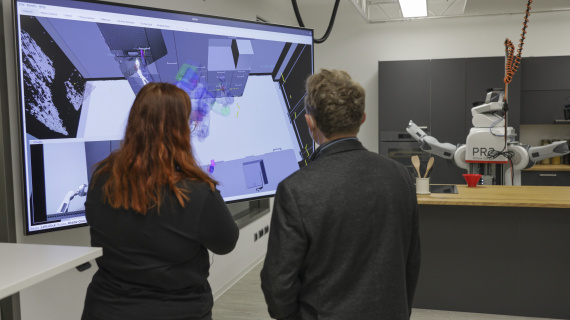 The festive opening of the labs was accompanied by an exhibition as well as live demonstrations of the PR2 and HSR robots.
The festive opening of the labs was accompanied by an exhibition as well as live demonstrations of the PR2 and HSR robots.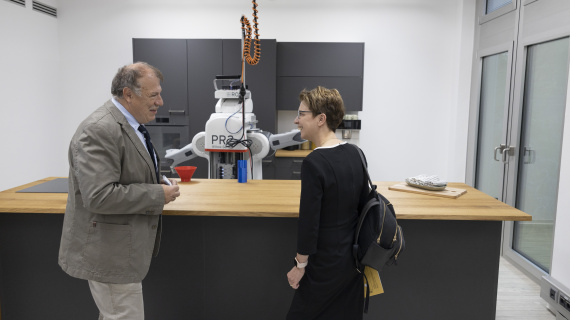 Dr. Claudia Schilling, Bremen's Senator for Science and Ports, in conversation with Professor Michael Beetz from the IAI.
Dr. Claudia Schilling, Bremen's Senator for Science and Ports, in conversation with Professor Michael Beetz from the IAI. 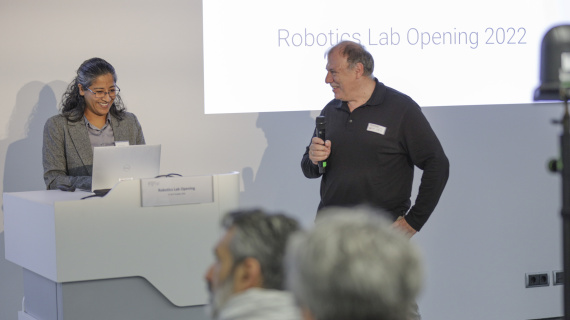 Dr. Karinne Ramírez-Amaro, associate professor at the Chalmers University of Technology in Sweden, here with Professor Michael Beetz, gave a talk about the ways in which robots can learn and reason from their experiences.
Dr. Karinne Ramírez-Amaro, associate professor at the Chalmers University of Technology in Sweden, here with Professor Michael Beetz, gave a talk about the ways in which robots can learn and reason from their experiences. Despite having to operate on a limited scale due to pandemic restrictions, the two-day Lab Opening was a resounding success that fostered connections between research and industry. A separate 'friends and family'-event was also held in January, where our staff showed the new labs to interested people in their lives. We were particularly grateful to be able to host these events in person again after a long time and that they were accompanied by such exciting discussions and an overall atmosphere of lively exchange. Although the focus of the event was to open the doors of our new laboratories to the public, it is also important for us as a research institute to keep our doors open, symbolically speaking, beyond events such as the Lab Opening.
We thus thank all participants from research and industry who contributed their diverse perspectives in lectures and plenary discussions. They all helped to promote scientific progress as well as the transfer of research between research and industry – at our research institute and beyond.
Lecture by Dr. Daniel Nyga (IAI/EASE) as part of the "EINFACH WISSENSWERT" exhibition for Robotics & AI
Lecture by Dr. Daniel Nyga (IAI/EASE) as part of the “EINFACH WISSENSWERT 2019” exhibition for Robotics & AI, which is located in the “House of Science” in Bremen. The lecture is embedded in the lecture in the series of lectures called “WISSEN UM 11”, where researchers give insight into state of the art research. The “House of Science” is a non-profit organisation to connect science with a broader community in and around Bremen.
Location: Haus der Wissenschaft, Sandstraße 4/5, 28195 Bremen
Date: Saturday, 9.03.19, 11:00h
Title: „Denn sie wissen, was sie tun – wie Roboter lernen“ (The talk will be held in german)
Meet us at ICRA'17!
We are happy to announce three accepted papers at this year's ICRA conference in Singapore, 29.05.17-02.06.17:
- A Cloud Service for Robotic Mental Simulations, Asil Kaan Bozcuoğlu, Michael Beetz (Session WeA4.2, 09:35–09:40)
- Instruction Completion through Instance-based Learning and Semantic Analogical Reasoning, Daniel Nyga, Mareike Picklum, Sebastian Koralewski, Michael Beetz (Session WeC11.3, 14:40–14:45)
- What No Robot Has Seen Before – Probabilistic Interpretation of Natural-language Object Descriptions, Daniel Nyga, Mareike Picklum, Michael Beetz, (Session WeC11.4, 14:45-14:50)
Michael Beetz is also an invited speaker at the workshop on AI Planning and Robotics: Challenges and Methods. He will give a talk on Robot planning for the mastery of human-scale everyday manipulation tasks on Monday, May 29, 13:30-14:00.
See you in Singapore!
NDR Radio Feature on Societal Impacts of Robots
In its scientific radio feature “Logo - Das Wissenschaftsmagazin”, broadcasted on the 5th of February, the NDR radio station addressed the question of societal impacts of autonomous robots. In the feature entitled “Helfer oder Konkurrenten?” (“Assistants or Competitors?”) Michael Beetz emphasized the novel opportunities of robots in the healthcare domain. The feature is available as an audio stream: http://www.ndr.de/info/Helfer-oder-Konkurenten,audio271770.html
Perspectives on the Creativity of AI Systems
 The Wissenschaft im Dialog initiative has launched the competition Beats & Bits about music composed by Artificial Intelligence.
The Wissenschaft im Dialog initiative has launched the competition Beats & Bits about music composed by Artificial Intelligence.
IAI member Dr. Daniel Nyga contributed a blog article about different perspectives on Artifical Intelligence and creativity. The article is in German and can be found at https://beatsundbits.de/kunst-oder-kuenstlich/.
New CoAI Joint Research Center explores co-constructive artificial intelligence
We are pleased to be able to further strengthen our research collaborations with our partner universities Bielefeld and Paderborn in the “Joint Research Center on Cooperative and Cognition-enabled AI” (CoAI).
The Center will investigate how artificial intelligence systems that perceive and act can learn to understand and reflect on their own behavior and the behavior of other agents to enable co-construction. Together with our research partners at the universities of Bielefeld and Paderborn, we aim to generate new potential for human-machine interaction and learning and are striving for an AI paradigm that informs and is informed by our understanding of human intelligence.
Open Science in the CoAI Virtual Research and Training Building
The heart of the research at the CoAI JRC will be a joint Virtual Research and Training Building, the CoAI ViB - a shared, digital laboratory that, in adherence to the open science spirit, will be accessible beyond the CoAI Center: The virtual building will allow visitors to take a tour through different virtual laboratories, with each floor of the building being dedicated to one of the central themes of the Joint Research Centre, so that everyone can learn about the results of the Center’s research.
Empowering a new generation of AI navigators
The center's commitment will not only be to advance current research by pooling expertise in integrated intelligence, but also to empower a new generation of thinkers and doers in this field: Through a shared curriculum and citizen science projects, we want to deepen the critical technological thinking of young audiences. In this way, we aim to empower the next generation to navigate AI-related issues that will affect our societies in the coming decades.
As a whole, the Center reflects the importance of our shared mission, which aligns our research at all three sites: Creating AI-based agents that understand what they and we are doing, that can support us flexibly and safely, and that we can trust. We look forward to contributing our perspective of cognition-enabled robotics as part of the joint research. Through synergies with our partner universities, we hope to enable new breakthroughs in AI research.
To learn more about the CoAI Joint Research Center, visit the CoAI JRC Website
Nomination for the Cognitive Award and the Service Award in ICRA 2018
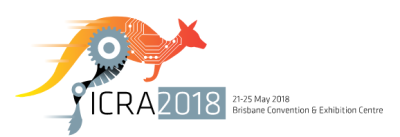
We are happy to announce that our joint research paper
- The Exchange of Knowledge using Cloud Robotics, Asil Kaan Bozcuoğlu, Gayane Kazhoyan, Yuki Furuta, Simon Stelter, Michael Beetz, Kei Okada and Masayuki Inaba
with JSK Lab., The University of Tokyo has been nominated for the cognitive award and the service award in IEEE ICRA 2018.
Hope to see you in Brisbane, Australia
Now open: Registration for the EASE Fall School 2023
The EASE Fall School organized by the Collaborative Research Center EASE is an opportunity to gain insight into the exciting field of cognition-enabled everyday robotics.
The Fall School gives early career researchers the opportunity to learn more about AI, robotics, and the challenging field of robot manipulation. In lectures and hands-on courses, students can exchange ideas with our invited speakers and experts from the EASE Collaborative Research Center.
Programm
Our EASE Fall School 2023 starts on September 11 and ends on September 15.
This year's confirmed lecturers include:
Erol Sahin Middle EAST Technical University
Daniel Leidner Robotics & Mechatronics Center – DLR
Michael Beetz University of Bremen
This year, the Workshop on Artificial Intelligence and Cognition (AIC) is co-hosted during the EASE Fall School. Participants of the Fall School and participants of the workshop will be able to network and exchange ideas. We strongly invite Fall School participants to present their work at the workshop.
Register now for early bird prices
As application for the EASE Fall School 2023 we ask for a short letter of motivation. The application deadline is September 4th, 2023, but you can save money by applying early:
The EASE Fall School 2023 fee package
- Early Bird: 380 EUR (registration until July 31st)
- Regular: 420 EUR
You can register here.
open research in robotics - introducing openEASE
Pizza Making Experiment Demonstrates the Potential of Open Research in Robotics
- openEASE is a platform where robots can learn to perform complex tasks faster based on the experiences of other machines
- Users can retrieve memorized episodes and ask queries about what the robot saw, reasoned, and did during that episode – and what effects it caused
- The platform combines “big data” storage with knowledge processing, cloud-based computation, and web technology
- The first elaborate experiment on the platform includes two robots cooperating to make fresh pizza
When human beings hit a tennis ball or perform a similar action, an episodic memory is created. We remember the movement of the arm and how much force we applied. This helps us to not blast the ball over the fence again the next time. Robots can benefit from episodic memories as much as humans – machines learn to perform complicated tasks much faster when they can draw from experiences. To facilitate this process, a platform called openEASE was created, where everyone can contribute to a growing database of “robot memories”. The goal: Creating an open research environment where robotics scientists share their work and access data from other researchers, including the option to let their robots communicate directly with the database. openEASE was presented at the 2015 IEEE International Conference on Robotics and Automation from May 26-30 in Seattle, where one paper related to the openEASE project was awarded the Best Service Robotics Paper
- RoboSherlock: Unstructured Information Processing for Robot Perception Beetz, Michael; Balint-Benczedi, Ferenc; Blodow, Nico; Nyga, Daniel; Wiedemeyer, Thiemo; Marton, Zoltan-Csaba
and a second one was finalist for the Best Cognitive Robotics Paper Award
- openEASE – A Knowledge Processing Service for Robots and Robotics/AI Researchers Beetz, Michael; Tenorth, Moritz; Winkler, Jan
Building knowledge on previous research
The idea behind openEASE is that researchers worldwide focus on many specific problems to enable robots to work autonomously, but in order to perform complex tasks like preparing a meal, this knowledge has to be shared and the machines’ capabilities need to be combined. “Big data” storage, knowledge processing, cloud computing, and web technology are utilized to provide researchers with a database that allows an easy analysis of robot experiences, whether it’s their own or other scientists’ research. In the future, robotic systems will be able to access their own and other robot’s episodic memories directly as well. At the same time, the data from all experiments can be used in new projects and in teaching. All information is gathered automatically while a robot performs a task. The collected data includes positions of individual parts, images from the machine’s perception system, and other sensor and control signal streams. In the database all information is annotated with semantic indexing structures that are automatically generated by the interpreter of the robot control system. These episodic memories can help the robotic systems assess what they were doing and enable them to answer queries about what they did, why they did it, how they did it, what they saw when they did it, and what happened when they did it. A web-based graphical query interface reduces the time and effort for such analyses dramatically.
Robots can learn from human actions, too
A kitchen scenario was chosen to test the functionality of openEASE and its accompanying software tools, because the tasks involved in preparing fresh food are highly complex. The first elaborate experiment on the platform concerns the preparation of pizza by two collaborating robots. Raphael, a PR2 robot with a Microsoft Kinect für Xbox One as its main perception device, retrieved different objects such as a tray and a bottle of ketchup and carried them wherever they were needed. Boxy, an individually designed robot with two Kuka manipulators, rolled out the dough, spread the tomato sauce, and added the toppings. When rolling out the dough, Boxy utilized the experience of a human being whose actions had been recorded previously, especially regarding the right amount of pressure and the movements of the rolling pin. The logs of the experiment allow to infer knowledge such as how the size of the pizza dough changed after each movement and what the robot arm’s trajectory was while reaching the dough. When Boxy was finished, Raphael took over again and placed the tray in the oven. Once the PR2 detected that a human had appeared and started the oven, it informed Boxy that the task was completed.
To open another road for robotic learning, data from simulators can also be added to openEASE to figure out the most efficient ways for completing specific tasks.
openEASE is open for registration
With all its detailed information, the knowledge base is an open research tool that highly improves the reproducibility of experimental results, e.g. by providing various tools for experiment summarization. Among them are automated video generation and a variety of infographic-like visualizations. openEASE also supports the analysis of perceptual capabilities of robotic agents, in particular when used in combination with RoboSherlock, a perception system which is equipped with a library of state-of-the-art perception methods. Researchers who are interested in using openEASE can register on the website in order to gain access to all tools and data. The team plans to provide an easily accessible interface for integrating new types of experiments and to constantly add new analysis modules to the system. This work is partly supported by the EU FP7 projects RoboHow (Grant Agreement Number 288533), ACat (600578), SAPHARI (287513), Sherpa (600958), and by the German Research Foundation.
openEASE within EU's Innovation Radar at CEBIT 2016
openEASE is invited to be part of the Innovation Radar stand of European Commission at CeBIT 2016 in Hannover between 14th and 16th of March. You can find openEASE booth at D50/17 in Hall 11.
openEASE is a web-based knowledge source for autonomous robots. It contains episodic memories of autonomous robots performing everyday activities: fetch and place, pizza cooking, chemical experiments, human-robot collaboration activities and many more.
Using a very powerful query language humans and robots can formulate semantic queries about the available episodic memories. openEASE reasons over these episodic memories and provides the humans and robots with specific answers.
openEASE at CeBIT 2017
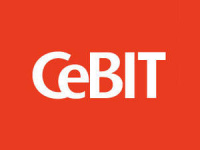 Dealing with knowledge is a crucial requirement for autonomous service
robots which are meant to perform complex tasks in everyday activities.
Dealing with knowledge is a crucial requirement for autonomous service
robots which are meant to perform complex tasks in everyday activities.
Nowadays humans will teach robots the necessary knowledge directly to make them competent in a specific task. Enabling robots to teach themselves by exchanging knowledge with other robots is the goal of our software platform openEASE.
The IAI will present openEASE at the CeBIT 2017, which is the biggest IT expo in the world. You can find us in Hall 8, booth E01 from the 22nd to 24th of March 2017.
Press releases:
- English: Press release openEASE at CeBIT
openEASE: nominated for EU's Innovation Radar Prize 2016
The Innovation Radar is an initiative of the European Commission focused on the identification of high potential innovations and the key innovators behind them in FP7, CIP and Horizon 2020 projects. It supports innovators by suggesting a range of targeted actions to assist them in fulfilling their potential in the market.
openEASE, as a novel cloud-based knowledge service which helps robots to accomplish vaguely stated actions by filling in missing knowledge pieces on demand, is a candidate for this award in the category of Industrial & Enabling Tech.
For more information, you can visit our award profile. You also have the chance of voting for us as your favourite innovator in this profile.
openEASE is finalist for "Best Cognitive Robotics Paper Award" of ICRA 2015
The advancement of cognitive capabilities and clarity of presentation lead “openEASE-A Knowledge Processing Service for Robots and Robotics/AI Researchers” to be nominated for “Best Cognitive Robotics Paper Award” at ICRA 2015.
openEASE is a web-based knowledge service for autonomous robots. It contains episodic memories of autonomous robots performing different activities: fetch and place, pizza cooking, chemlab experiments, human-robot collaboration activities and many more. openEASE exposes to humans and autonomous robots a set of semantic queries in a very powerful query language and while answering the queries it reasons over the available episodic memories.
OpenEASE presented at ICT innovation radar's pitch session
Our department was chosen as one of the 16 finalists for the EU's ICT innovation radar prize 2016. List here
Two of our team members, Alexis Maldonado and Daniel Nyga, traveled to Bratislava to attend the EU's ICT Proposer's Day (26th of September 2016). They presented OpenEASE to a jury of four business experts and many attendees. We also had the chance to show the OpenEASE system live at the Innovation Booth.
Our innovation was very well received and we discussed about our plans for the future. Congratulations to all the finalists and winners of the ICT innovation radar prize!
openEASE video: Finalist for Fast Forward Science Community Award
Open Lab Day
On the 28th of June 2018, we will open the doors to our lab in cooperation with our pupil project SMILE. Don't miss this opportunity to learn more about our research and see live demonstrations of our robots and virtual reality experiments.
All interested people are invited to visit our lab on the 28th of June, 2018 between 11:00 and 17:00. Our address and information on how to get to the lab can be found on the Contact page.
Ocean Sampling Day: DNA Extraction Demonstration
 As a side-event of the Ocean Sampling Day 2014 there will be a special public demonstration in our lab on Saturday, the 21st of June, at 10:30. Our PR2 robot will perform some laboratory tasks which are part of a DNA extraction process, such as pipetting and centrifugation using ordinary lab equipment. Please, confer to our press release (in German) for more details about this event. We are looking forward to see you on Saturday! For those who could not attend, the recording of the event can be watched on the following links (starts at ~30 mins):
Webcam,
RobotCam.
As a side-event of the Ocean Sampling Day 2014 there will be a special public demonstration in our lab on Saturday, the 21st of June, at 10:30. Our PR2 robot will perform some laboratory tasks which are part of a DNA extraction process, such as pipetting and centrifugation using ordinary lab equipment. Please, confer to our press release (in German) for more details about this event. We are looking forward to see you on Saturday! For those who could not attend, the recording of the event can be watched on the following links (starts at ~30 mins):
Webcam,
RobotCam.
Our contribution to this year's Informatica Feminale
Women face unique challenges in computer science, a field that has been designed for men for too long, and where women are still underrepresented. Although information technology has been with us for a long time and artificial intelligence is now rapidly finding its way into more and more areas of life, there seem to be few efforts at a professional level to integrate the diverse interests of women into computer science.
Instead, computer science as a discipline still tends to be oriented towards the traditionally male-dominated worlds of experience in everyday life and work, resulting in products and applications geared predominantly towards men. As a result, computer science threatens to remain an unattractive area for women, where they do not see themselves represented.
What can be done to change this?
To address and counteract these challenges, opportunities for cross-institutional exchange and mutual support have become an invaluable resource for women in computing.
The Informatica Feminale
The University of Bremen’s Informatica Feminale aims at providing such an opportunity: to support and connect female computer science students and professionals in order to promote equal opportunities for women in the field.
About the Informatica Feminale
From August 14 to 29, 2024, the 27th Informatica Feminale - Summer University for Women in Computer Science will take place at the University of Bremen. Over 60 courses will be offered on current specialist topics as well as interdisciplinary topics. As part of the Informatica Feminale, Michaela Kümpel, postdoctoral researcher and lecturer at our institute, is giving the course Creating Actionable Knowledge Graphs for Agent Applications.
About the course
This course focuses on the use of knowledge in applications to support users in their daily lives. It covers topics such as how to represent knowledge in a way that it can be understood by machines, how to acquire knowledge from different sources (including web scraping), and how to link such different pieces of knowledge. It will also discuss how agents can reason about this knowledge and how different agents such as websites, AR applications, or robots can use knowledge to assist users in their daily lives. The course will provide tutorials, and participants will be asked to choose a topic of their own interest (such as recommending a diet, filtering recipes based on preferences, or providing basic health support) for which they will create an actionable knowledge graph to be used for user support on a website. All necessary steps are covered in the course and tutorial.
Target group
The course is aimed at advanced female students and practitioners from engineering, computing and related fields.
Requirements
Activities before class time: mandatory email exchange with lecturers. Installation of Jupyter, Python, Pip (with support), exchange about course idea: 3 hours.
Credit for participation
Participants can receive one Credit Point (ECTS) for taking part in the course. Further credit points can be earned by submitting course work/ additional work.
Curious to learn more?
Extensive background information, the full course program and registration can be found here: https://www.informatica-feminale.de/
PRAC is now available on mobile devices too
Probabilistic Action Cores (PRAC) system has a new web interface: PRACWeb which allows users to test out on smart devices the capabilities of the system. PRAC system is the implementation of a novel approach for probabilistic high-performance natural-language interpreter. The interpreter has a knowledge-driven approach. It is inspired by concepts of cognitive psychology and models actions as abstract event types. PRACWeb allows the user to generate robot-executable plans from natural-language instructions. PRAC relies on pracmln, which is a toolbox for statistical relational learning and reasoning. It includes tools for standard graphical models (in particular, MLNs). The web interface of pracmln is WebMLN. It allows the users to try out the capabilities of pracmln system.
Prof. Beetz received honorary degree from the university of Örebro
 The head of the IAI, Prof. Beetz, has received an honory doctorate last week from the swedish university of Örebro. In a festive ceremonial, he was awarded for his exceptional, international research and his longstanding cooperation with the university of Örebro. Besides being a second assessor for many PhD theses, Prof. Beetz also held lectures in the context of the winter school of the AASS Cognitive Robotic Systems Labs.
The head of the IAI, Prof. Beetz, has received an honory doctorate last week from the swedish university of Örebro. In a festive ceremonial, he was awarded for his exceptional, international research and his longstanding cooperation with the university of Örebro. Besides being a second assessor for many PhD theses, Prof. Beetz also held lectures in the context of the winter school of the AASS Cognitive Robotic Systems Labs.
Die Bremer Universitäts-Gespräche 2016 lead by Prof. Michael Beetz, PhD and Prof. Dr. Andreas Birk
Since 1988 the annual Bremer Universitäts-Gespräche is organized by the Wolfgang-Ritter-Stiftung, the University of Bremen and the Unifreunde.
“Cognition-enabled Robotics: Democratising a Disruptive Technology” was the theme discussed this year. The event gathered together renowned researchers in the fields of Artificial Intelligence and Robotics.
The reception of the event took place in the laboratory of the Institute for Artificial Intelligence from University of Bremen with live demonstrations on robots and virtual reality and poster session for the other software systems developed here.
The event continued with the talks of the invited researchers. Prof. Dr. Yiannis Aloimonos from The University of Maryland presented an overview of grammar of actions. Digital innovation platforms for robotics were discussed by Prof. David Lane from Heriot Watt University. Prof. Gordon Cheng from Technical University of Munich discussed the robots in the age of innovation. Memory systems for robotic agents was the subject addressed by Prof. Tony Belpaeme from Plymouth University. Prof. Gregory O’Hare, PhD from University College Dublin discussed the autonomous robots and intelligent environments. The robots co-workers were the subject of the talk of Prof. Dr. Alin Albu-Schaeffer from Institute of Robotics and Mechatronics of DLR. Prof. Dr. Markus Vincze from the Technical University of Vienna discussed the available open source libraries for robot perception. The challenges imposed by robot-centred knowledge representation were addressed by Prof. Dr. Herman Bruyninckx from the University of Leuven. Dr.-Ing. Georg von Wichert from Siemens AG and Dr.-Ing. Amos Albert from Bosch Deepfield Robotics were discussing the democratising a disruptive technology.
The discussions were moderated by Prof. Dr.-Ing. Bernd Scholz-Reiter, the rector of the University of Bremen, Prof. Dr.-Ing. Tanja Schultz and Prof. Dr. Rainer Malaka professors at University of Bremen and Prof. Dr.-Ing. Katja Windt, the rector of the Jacobs University Bremen and Prof. Dr. Andreas Birk professor at the Jacobs University Bremen and Dr. Uwe Haass from RoboConsult.
The opening and welcoming of the event were given by Prof. Dr. Eva Quante-Brandt from Minister for Health, Science and Consumer Protection of Bremen respectively Prof. Dr. Helge Bernd von Ahsen from Wolfgang-Ritter-Stiftung.
The entire event was coordinated by Prof. Michael Beetz, PhD from the University of Bremen and Prof. Dr. Andreas Birk from the Jacobs University Bremen.
REMARO seeks candidates for 15 PhD positions

Work together on more reliable AI for marine robotics (vision, navigation, perception, planning, failure recovery, testing, verification, model-checking, model-driven engineering …). There are 15 different research projects available with different prerequisites and focus, located in Copenhagen, Oslo, Porto, Delft, Aachen, and in our Institute for Artificial Intelligence.
We are offering a position in the following field:
- Digital Twin Knowledge Base for submarine robot inspection/manipulation
You can find a in-depth description for the position at our Institute on the Jobs overview page and the REMARO website.
RoboEarth article selected as Best Paper Award Finalist
We are pleased to announce that the article Representation and Exchange of Knowledge about Actions, Objects, and Environments in the RoboEarth Framework that Moritz Tenorth and Michael Beetz co-authored has been selected as Best Paper Award Finalist by the IEEE Transactions on Automation Science and Engineering (T-ASE). The article presents a knowledge representation language tailored to the robotics use case that allows robots to represent and exchange task descriptions, environment maps and object models via a Web-based platform.
RoboSherlock awarded as best paper at ICRA 2015
Its originality, technical merits, clarity of presentation, potential impact in the field of service robotics lead RoboSherlock to win the “Best Service Robotics Paper” at ICRA 2015.
RoboSherlock is a cognitive perception system built on top of the principles of unstructured information management. Among other extremely valuable papers presented at this conference, RoboSherlock proved to be a very strong contribution to the advancement of service robotics in research and industry R&D.
RoboSherlock released
We are happy to announce that the core implementation of our perception framework, RoboSherlock, is now available as an open source project. RoboSherlock is based on the principle of unstructured information management, and offers a unified framework for integrating multiple perception experts, that hypothesize about images, annotate them and finally test and rank these annotations. For more information visit the project website at www.robosherlock.org
Robotics Start-Up Ubica Wins Award for Innovative Strategies in Retail
We are celebrating an important award with the robotics start-up Ubica Robotics, which was spun out from the IAI: The ZukunftHandel Award, an initiative of the German Retail Association, honours outstanding examples of forward-thinking strategies in retail. The jury was convinced by Ubica’s digital twins as an innovative and practice-oriented solution that saves time and money in retail.
About the startup
The start-up Ubica Robotics was founded in 2020 by Ferenc Bálint-Benczédi, Georg Bartels, Alexis Maldonado and Jonas Reiling as a spin-out from the University of Bremen. The start-up is based on the research work of its founders within the framework of the H2020 research project “Robotics Enabling Fully-Integrated Logistics Lines for Supermarkets” (REFILLS) funded by the EU Commission. On this basis, the start-up develops robots that improve internal processes in retail stores.
What makes Ubica’s retail robots innovative?
The ZukunftHandel award is well-deserved: There is no doubt that Ubica's robots are outstanding in the German stationary retail sector. With their wide range of applications, they occupy a unique position. What also sets UBICA's robots apart is that they are backed up by detailed digital models and linked to background knowledge, enabling them to do their best work on the basis of so-called digital twins.
Every night after store closing time, Ubica's UB5 scanning robots autonomously roam the retail stores to capture, recognise and identify store inventory, and create and update store digital twins on a daily basis.
Based on these digital twins, which represent an accurate 3D digital image of the store, inventory management can be optimized in several ways: Customers and staff can find products more quickly, shelf gaps can be identified and closed early, and stocktaking can be simplified. This gives employees more time during the day to advise their customers. Overall, the use of Ubica robots promises stores to save time and money.
For more information about Ubica, visit their website.
RTL Nord visiting our lab
A TV team from RTL Nord was visiting our lab to check out the robots and Virtual Reality environment.
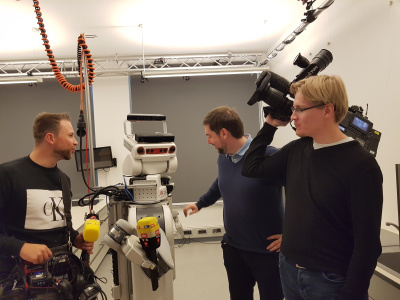
Science Award 2022 for Startup Ubica Robotics GmbH
 The startup Ubica Robotics GmbH, which emerged from the Institute for Artificial Intelligence, has received the Science Award endowed with 50,000 euros, in the category “Best Startup”.
The prize was awarded by the EHI Foundation on June 1, 2022 in Düsseldorf.
The startup Ubica Robotics GmbH, which emerged from the Institute for Artificial Intelligence, has received the Science Award endowed with 50,000 euros, in the category “Best Startup”.
The prize was awarded by the EHI Foundation on June 1, 2022 in Düsseldorf.
Since their founding in 2020, Ubica develops autonomous scanning robots creating digital twins of retail stores. Their technology is based on research results from the “REFILLS” project, funded by the European Commission and provides information on the the location of products, store layout and the actual inventory and turnover of goods. By identifying gaps on shelves, a significant increase in efficiency and productivity in retail stores can be processed, as the supply chain can be individually optimized for each store. This not only makes processes more cost-efficient, but also improves the shopping experience for customers.
We sincerely congratulate Dr.-Ing. Ferenc Bálint-Benczédi, Georg Bartels, Alexis Maldonado und Jonas Reiling as the founders of Ubica for this special prize.
Find more information about Ubica here: https://www.ubica-robotics.eu/
Second Virtual TransAIR Event
We are delighted to announce the upcoming TransAIR virtual workshop on “Cognitive Architectures for Robot Agents” which will be held from 22nd to 28th March 2021.
This TransAIR workshop will bring together leading experts to address the challenges of developing cognitive architectures for robot agents. The primary goal of the workshop is to open a discussion on possible interdisciplinary collaborations and the identification of prospects for collaborative development, ideally in an open-source open-systems framework.
Stay tuned for updates or find further information about the workshop on our website or contact us via email: contact@transair-bridge.org
IAI demonstrated Unreal-based Rescue Simulation
Our FP7 project, SHERPA, came to an end with a final review between 1st and 3rd March in Davos, Switzerland. As IAI team, we had the chance to demonstrate our HMI-enabled high-level planing and reasoning in a wide-area rescue scenario. We also developed an Unreal game engine-based simulation with ROS interface and RoboSherlock perception for this rescue mission.
Our demonstration has received very positive feedback from the reviewers and partners. We thank all of the contributors for this successful project. It was a great experience!
Blog
In its scientific radio feature “Logo - Das Wissenschaftsmagazin”, broadcasted on the 5th of February, the NDR radio station addressed the question of societal impacts of autonomous robots. In the feature entitled “Helfer oder Konkurrenten?” (“Assistants or Competitors?”) Michael Beetz emphasized the novel opportunities of robots in the healthcare domain. The feature is available as an audio stream: http://www.ndr.de/info/Helfer-oder-Konkurenten,audio271770.html
Start of bachelor project SUTURO/SUTORO
This week sees the kick-off of this year's bachelor project 'sudo tidy-up-my-room' (SUTURO/SUTORO). Our entire team is very excited about this exploratory course, and we'd like to invite all interested students –registered or unregistered– to join the first plenary meeting (Plenum).
- where: TAB building, room 0.31/0.32, entrance E
- when: Friday, Oct. 18th 2013, 10:00 am
More information on the project can be found here.
Successful demonstration by bachelor project SUTURO
Our bachelor project SUTURO is making excellent progress: The project, partly self-organized by 14 Bachelor students, aims at teaching a PR2 robot to tidy up a kitchen. This involves very challenging tasks in robot perception, manipulation and grasping, task-level coordination and knowledge representation to recognize objects, infer where they shall be put, and interact with them in the appropriate way.
In a recent demonstration, the robot was able to identify the objects in front of it, infer if they are food or not, and sort them into the correct box. This demonstration was based on software developed by researchers at the IAI that has successfully been adapted and integrated by the project participants.
Successful Open Lab Day
Yesterday, we had a successful open lab day and had the opportunity to welcome many interested visitors to our lab. We would like to thank everybody for interesting discussions, new ideas and a useful exchange about opinions about the future of robotics. We would also like to thank the DFKI Bremen for the cooperation.
Talk by Bruno Siciliano
Thanks to Bruno Siciliano from University of Naples Federico II for giving a great talk titled “Robotic Dynamic Manipulation”!
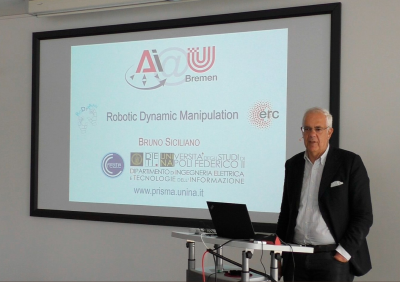
Talk by Carlos H. Corbato, TU Delft
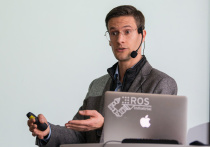 We are very honoured that Dr. Carlos Hernandez Corbato from TU Delft was keynote speaker at the opening session of the EASE Spring Meeting on March 11, 2019. The title of his great talk was “ROS and robot control architectures, from open source to metacontrol”. Carlos H. Corbato is a postdoctoral researcher at the Department of Cognitive Robotics, TU Delft, and currently the coordinator of the ROSIN European project granted in the H2020 program.
We are very honoured that Dr. Carlos Hernandez Corbato from TU Delft was keynote speaker at the opening session of the EASE Spring Meeting on March 11, 2019. The title of his great talk was “ROS and robot control architectures, from open source to metacontrol”. Carlos H. Corbato is a postdoctoral researcher at the Department of Cognitive Robotics, TU Delft, and currently the coordinator of the ROSIN European project granted in the H2020 program.
Talk by Elizabeth Croft, Monash University
 We were delighted to welcome Prof. Elizabeth Croft in our institute yesterday. She is an expert in Human-Robot-Interaction and discussed with us several aspects of successful interaction and control methods.
Her talk was a great spotlight on research results of recent HRI experiments and provided a diverse overview of different interaction modalities.
We were delighted to welcome Prof. Elizabeth Croft in our institute yesterday. She is an expert in Human-Robot-Interaction and discussed with us several aspects of successful interaction and control methods.
Her talk was a great spotlight on research results of recent HRI experiments and provided a diverse overview of different interaction modalities.
Professor Elizabeth A. Croft is the Dean of Engineering at Monash University and Professor in the Departments of Mechanical and Aerospace Engineering, and Electrical and Computer Systems Engineering. She held the Natural Science and Engineering Research Council of Canada Chair for Women in Science and Engineering (BC/Yukon) from 2010-2015 and the Marshall Bauder Professorship in Engineering Economics, Business and Management Training from 2015-2017.
Talk by Ingmar Posner
We'd like to thank Ingmar Posner from the Oxford Robotics Institute for giving a great talk about “Robots Thinking Fast and Slow” in our Institute yesterday.
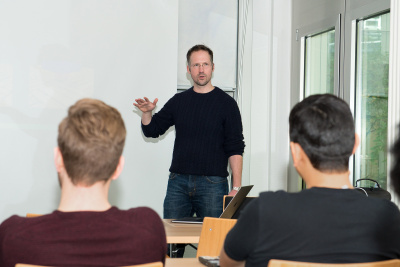
Talk by Moritz Tenorth
On Tuesday, 29th May 2018, former colleague Moritz Tenorth from magazino visited and gave a talk.
ABSTRACT
In his talk, Moritz talked about some of the recent developments at the Munich-based startup Magazino. Magazino develops and builds perception-controlled, mobile robots for intralogistics. With Magazinos technology individual objects can be identified on the shelf and localized via 2D and 3D cameras, securely grasped and finally placed precisely at their destination. Moritz also talked about some of his personal lessons learned during his transition from an academic to a startup working environment.
CV:
Dr. Moritz Tenorth is currently the CTO of the Munich-based robotics startup Magazino. Before joining Magazino in 2015, we was working as a Post-Doc in the Institute for Artificial Intelligence at the University of Bremen. During his PhD at TU Munich, he investigated knowledge representation and processing technology for robotics, and developed the KnowRob framework.
Talk invitation: "Inductive Biases for Robot Reinforcement Learning" by Prof. Jan Peters
On Wednesday, July 5th, we will welcome Prof. Jan Peters for his talk “Inductive Biases for Robot Reinforcement Learning” at our institute.
Jan Peters is the head of the Systems AI for Robot Learning (SAIROL) research group at the German Research Center for Artificial Intelligence (DFKI) as well as a founding member of the Hessian Center for Artificial Intelligence.
Talk abstract
Autonomous robots that can assist humans in situations of daily life have been a long standing vision of robotics, artificial intelligence, and cognitive sciences. A first step towards this goal is to create robots that can learn tasks triggered by environmental context or higher level instruction.
However, learning techniques have yet to live up to this promise as only few methods manage to scale to high-dimensional manipulator or humanoid robots. In this talk, we investigate a general framework suitable for learning motor skills in robotics which is based on the principles behind many analytical robotics approaches.
To accomplish robot reinforcement learning from just few trials, the learning system can no longer explore all learn-able solutions but has to prioritize one solution over others – independent of the observed data. Such prioritization requires explicit or implicit assumptions, often called ‘induction biases’ in machine learning.
Extrapolation to new robot learning tasks requires induction biases deeply rooted in general principles and domain knowledge from robotics, physics and control. Empirical evaluations on a several robot systems illustrate the effectiveness and applicability to learning control on an anthropomorphic robot arm.
These robot motor skills range from toy examples (e.g., paddling a ball, ball-in-a-cup) to playing robot table tennis, juggling and manipulation of various objects.
The talk is open to the interested public. It will take place on Wednesday, July 5 at 11:00 a.m. in room 0.30 on the ground floor of the TAB building, Am Fallturm 1, entrance E.
Technology Transfer Award for Ubica Robotics - Startup
We are celebrating an important award with the robotics start-up Ubica Robotics, which was spun off from the IAI. Together with the University of Bremen and dmTech GmbH, Ubica Robotics has received the euRobotics Technology Transfer Award 2022 at the European Robotics Forum in Rotterdam, which took place last week from June 28 to 30 in Rotterdam.
The euRobotics Technology Transfer Award, now in its 18th edition, honors outstanding examples of technology transfer in robotics and automation resulting from collaboration between research and industry.
About the startup
The start-up Ubica Robotics was founded in 2020 by Ferenc Bálint-Benczédi, Georg Bartels, Alexis Maldonado and Jonas Reiling as a spin-off of the University of Bremen. The foundation of the start-up is based on the research work of its founders within the framework of the H2020 research project “Robotics Enabling Fully-Integrated Logistics Lines for Supermarkets” (REFILLS), which was funded by the EU Commission. Ubica Robotics’ founders used the knowledge gained in the REFILLS project as the basis for the development of their robots.
The transition from prototype to production has been successful: since moving into the premises of Schuppen 1 in Bremen's Überseestadt district, the start-up has been growing steadily and already has robots working on a daily basis at customers’ stores.
About the Ubica robots
Every night after closing, Ubica's scanning UB5 robots roam autonomously through retail stores to capture, recognize and identify the stores' inventory, creating and updating the stores' digital twins on a daily basis.
Based on these digital twins, which represent an accurate 3D digital image of the store, inventory management can be optimized in several ways: Customers and employees can find products more quickly, shelf gaps can be identified and closed early and stocktaking can be simplified. Overall, the use of the inventory robot promises to result in time savings and cost savings.
With their wide range of applications in the retail sector, Ubica’s robots occupy a unique position in Germany. Competition for them comes primarily from the United States, where more lenient privacy laws do not restrict robots to after-hours use.
For more information about UBICA, visit their website
Moritz Tenorth and Michael Beetz win Best Cognitive Robotics Paper Award at ICRA 2012
We are very proud to announce that Moritz Tenorth and Michael Beetz with their co-authors Alexander Perzylo and Reinhard Lafrenz won the Best Cognitive Robotics Paper Award at ICRA 2012 with the paper titled: The RoboEarth language: Representing and Exchanging Knowledge about Actions, Objects, and Environments. Congratulations!
OpenEASE and RoboSherlock @ AAMAS 2015 in Istanbul
openEASE the web-based knowledge service for robots will be presented for the first time at AAMAS. The workshop paper will summarize the way in which the robots and robotics researchers can benefit on openEASE's knowledge processing mechanisms. The full paper will present an approach on how to design control programs able to deal with vague action and object descriptions while monitoring unexpected events and reacting to them.
Full papers:
- Jan Winkler and Michael Beetz, “Generalized Plan Design For Autonomous Mobile Manipulation in Open Environments”.
Workshop papers:
- Georg Bartels and Daniel Beßler and Michael Beetz and Moritz Tenorth and Jan Winkler, “How to Use OpenEASE: An Online Knowledge Processing System for Robots and Robotics Researchers”
RoboSherlock is at AAMAS for the first time. It is a cognitive perception system build on top of the principles of unstructured management information architecture. The full paper will present an approach on how to enable robotic perception systems to better deal with the variations of appearances and perceptual properties that real-world objects exhibit and how to perceive the affordances of the variety of perceptual tasks they have to perform. The workshop paper will present how RoboSherlock interacts with Open EASE and boosts the perception capabilities of a robotic agent performing household chores.
Full papers:
- Thiemo Wiedemeyer, Ferenc Balint-Benczedi, Michael Beetz, “Pervasive 'Calm' Perception for Autonomous Robotic Agents”.
Workshop papers:
- Ferenc Balint-Benczedi, Thiemo Wiedemeyer, Moritz Tenorth, Daniel Beßler and Michael Beetz, “A Knowledge-Based Approach to Robotic Perception using Unstructured Information Management”
The IAI at ICRA 2014 in Hong Kong
Two papers of our group have been accepted for presentation at ICRA 2014 in Hong Kong: The first one investigates how statistical relational learning methods can be used in ensemble-of-experts-based perception systems and boost the performance of individual methods. The second paper deals with the generation of expressions in controlled natural language.
- Daniel Nyga, Ferenc Balint-Benczedi, Michael Beetz, “PR2 Looking at Things: Ensemble Learning for Unstructured Information Processing with Markov Logic Networks”. Presentation on Tuesday June 3rd at 16:40.
- Nicholas Hubert Kirk, Daniel Nyga, Michael Beetz, “Controlled Natural Languages for Language Generation in Artificial Cognition”. Presentation on Wednesday June 4th at 17:20.
OpenEASE and RoboSherlock @ ICRA 2015 in Washington State
openEASE the web-based knowledge service for robots will be presented for the first time at ICRA. The paper presenting it offers an overview of the types of data it holds and the types of functionalists it exposes.
- Michael Beetz, Moritz Tenorth, Jan Winkler, “OPEN-EASE - A Knowledge Processing Service for Robots and Robotics/AI Researchers”.
RoboSherlock is at ICRA for the first time. It is a cognitive perception system built on top of the principles of unstructured management information.
- Michael Beetz, Ferenc Balint-Benczedi, Nico Blodow, Daniel Nyga, Thiemo Wiedemeyer, Zoltan-Csaba Marton, “RoboSherlock: Unstructured Information Processing for Robot Perception”.
The IAI at the Robotics4Labautomation symposium
Last week, the IAI participated in the Robotics4Labautomation symposium organized by the TraceBot project in Konstanz, Germany. The one-day event brought together laboratory automation and robotics experts from research and industry to discuss the current state of research in laboratory automation in the healthcare industry.
As part of the symposium, IAI director Michael Beetz and IAI researcher Franklin Kenghagho Kenfack explained in their presentations “The digital twin” and “Perception through cognitive emulation” how healthcare processes can be improved using AI methods.
A digital twin for sterility testing in healthcare
The development of new healthcare products is a delicate process that must be carried out with the utmost care and precision. Nothing can go wrong, especially when it comes to sterile medical devices, and systematic checks are required to ensure that each step has been successfully completed. The goal of the EU-funded TraceBot project is to develop a robotic system for sterility testing. The robotic system to be developed will be able to track the steps it has taken and understand whether it has performed the intended actions correctly. To this end, we are developing a semantic digital twin that can be integrated into a laboratory automation system. By enabling traceability with the digital twin infrastructure, we contribute to TraceBot's goal of creating an intelligent digitized laboratory of the future.
The TraceBot project
IAI is part of the TraceBot project. TraceBot receives funding from the European Union's H2020-EU.2.1.1. INDUSTRIAL LEADERSHIP programme runs until 2025. For more information on the TraceBot project, visit the TraceBot website: https://www.tracebot.eu/
The IAI at the European Robotics Forum 2023
As a member of the euROBIN project, the IAI had the chance to connect with the European robotics community at this year's European Robotics Forum (ERF).
Project EuroCore – a European Robotic Collaborative Repository
IAI-head Michael Beetz, who was joined by IAI researchers Giang Nguyen and Sascha Jongebloed, was one of speakers at this year’s ERF. In his talk as part of the workshop “New Robotics and AI projects”, he presented a suggestion for how euROBIN can make the most of the research results and technological platforms of its core partners with Project EuroCore – a European Robotic Collaborative Repository. With the repository developed within project EuroCore, it will be easier for euROBIN-partners to collaboratively use the software developed.
The IAI's contribution with project EuroCore is in line with the agenda of the euROBIN project to foster a community that openly shares research tools and results between science and industry in order to advance the field of AI-powered robotics.
Visitors from Seoul National University
For three very interesting weeks, researchers S.Jung, J. Kim, T. Kim and C. Lee from Seoul National University visited our Institute. During their visit they mostly collaborated with our group member Asil Kaan Bozcuoglu on how a deep imitation learning framework can be implemented on Toyota HSR for kitchen manipulations with stunning results. We are looking forward to future collaboration.
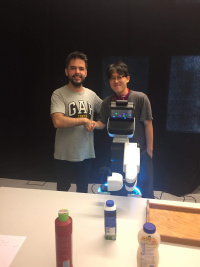
Webinar on "The innovative Virtual Research Building (VRB) for AI-powered and cognition-enabled robotics"
𝗦𝗮𝘃𝗲 𝘁𝗵𝗲 𝗱𝗮𝘁𝗲! We are taking part in AI Month mAI by Rise of AI (ki-deutschland.de) and cordially invite you to the upcoming event. One month. One mission. Make AI accessible.
Details
𝗢𝗻 𝟮𝟮.𝟬𝟱.𝟮𝟰 𝗳𝗿𝗼𝗺 𝟭𝟮:𝟬𝟬-𝟭𝟰:𝟬𝟬 𝗽𝗺, the Institute for Artificial Intelligence (IAI) at the University of Bremen will host a 𝘄𝗲𝗯𝗶𝗻𝗮𝗿 𝗼𝗻 “𝗧𝗵𝗲 𝗶𝗻𝗻𝗼𝘃𝗮𝘁𝗶𝘃𝗲 𝗩𝗶𝗿𝘁𝘂𝗮𝗹 𝗥𝗲𝘀𝗲𝗮𝗿𝗰𝗵 𝗕𝘂𝗶𝗹𝗱𝗶𝗻𝗴 (𝗩𝗥𝗕) 𝗳𝗼𝗿 𝗔𝗜-𝗽𝗼𝘄𝗲𝗿𝗲𝗱 𝗮𝗻𝗱 𝗰𝗼𝗴𝗻𝗶𝘁𝗶𝗼𝗻-𝗲𝗻𝗮𝗯𝗹𝗲𝗱 𝗿𝗼𝗯𝗼𝘁𝗶𝗰𝘀” led by Prof. Dr. h.c. Michael Beetz, PhD. Co-speakers: Dr. Michaela Kümpel, Vanessa Hassouna, Sascha Jongebloed, Arthur Niedzwiecki
Participation fee: free of charge
Webinar language: German
Requirement: high level of motivation
Via Zoom Link: https://uni-bremen.zoom-x.de/j/64073931541?pwd=VkMyQkpEOW1kdmhpb0NRNkcyNWFTZz09
Have you ever thought about experiencing cutting-edge scientific research live and even trying it out for yourself? With our VRB webinar we offer you this opportunity! Experience what it's like to work in innovative virtual research laboratories and gain basic knowledge in leading research fields.
The Virtual Research Building (VRB) is an integrated ecosystem designed to promote the development of AI-powered and cognition-enabled robotics. It supports the entire research and innovation pipeline from talent acquisition and training to collaboration in cutting-edge research and knowledge transfer for economic and societal benefit.
With the VRB, we offer convenient, open access to our research infrastructure for cooperative and cognition-based robotics and AI. In our webinar, you will gain insights into how you can benefit from this revolutionary platform equipped with state-of-the-art laboratories. Don't miss this opportunity and discover the potential of our VRB.
Join us and shape the future with us!
Weser Report describes IAI's Raphael "the robot for daily usage"
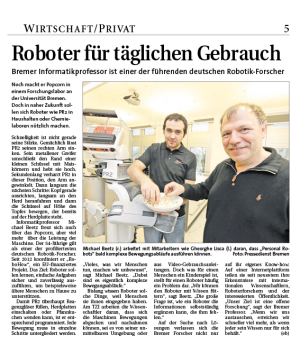
After their visit in our laboratory the reporters from Weser Report described Raphael as “the robot for daily usage” in their article. They had the chance to see how Raphael learns from games. They they saw him autonomously fetching different cooking containers and operating the kitchen stove in order to prepare the popcorn. Furthermore the reporters saw Raphael opening and closing the test tubes which contain the substance which must be pipetted. They were surprised to see Raphael's dexterity to use the pipette and operating the centrifuge in order to separate a the substances in a solution. The reporters were also impressed by the European project RoboHow which is lead by Uni Bremen trough Prof. Michael Beetz, PhD.
Weser Report is one of the most popular magazine in Bremen and North West Germany.
Worldwide RoboHow Media Attention
We are pleased to announce that the RoboHow EU project coordinated by the Institute for Artificial Intelligence has received major attention in media-outlets all over the world, including the MIT Technology Review and the International Business Times. While the review demonstrations from year 2 (pancake baking) and year 3 (pizza making) are the main focus, all aspects of RoboHow's autonomous robot activity is described in detail in over 50 different articles worldwide.
Click here to view an interactive map, showing where in the world news media is reporting on RoboHow's research success.
Prof. Dr. hc. Michael Beetz PhD
Head of Institute
Contact via
Andrea Cowley
assistant to Prof. Beetz
ai-office@cs.uni-bremen.de
Discover our VRB for innovative and interactive research
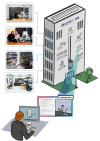
Memberships and associations:








